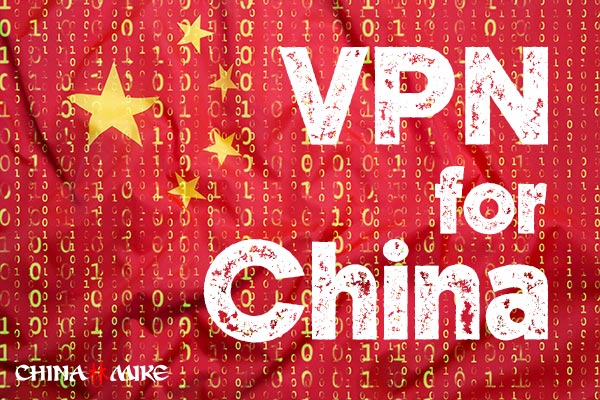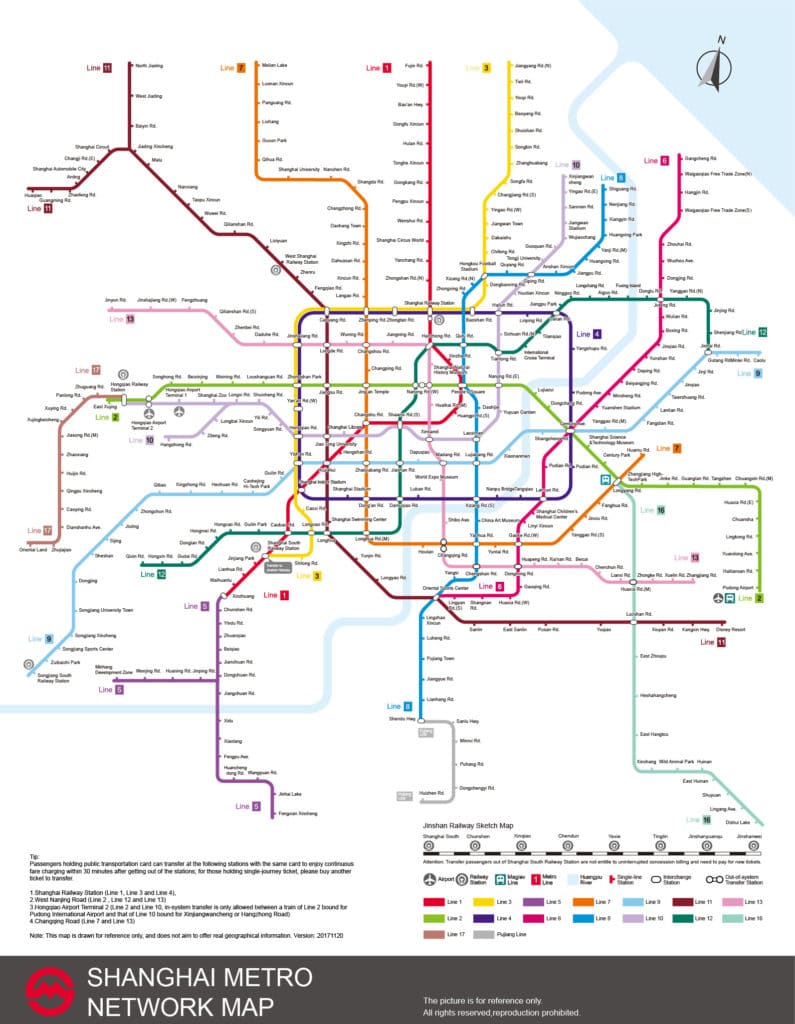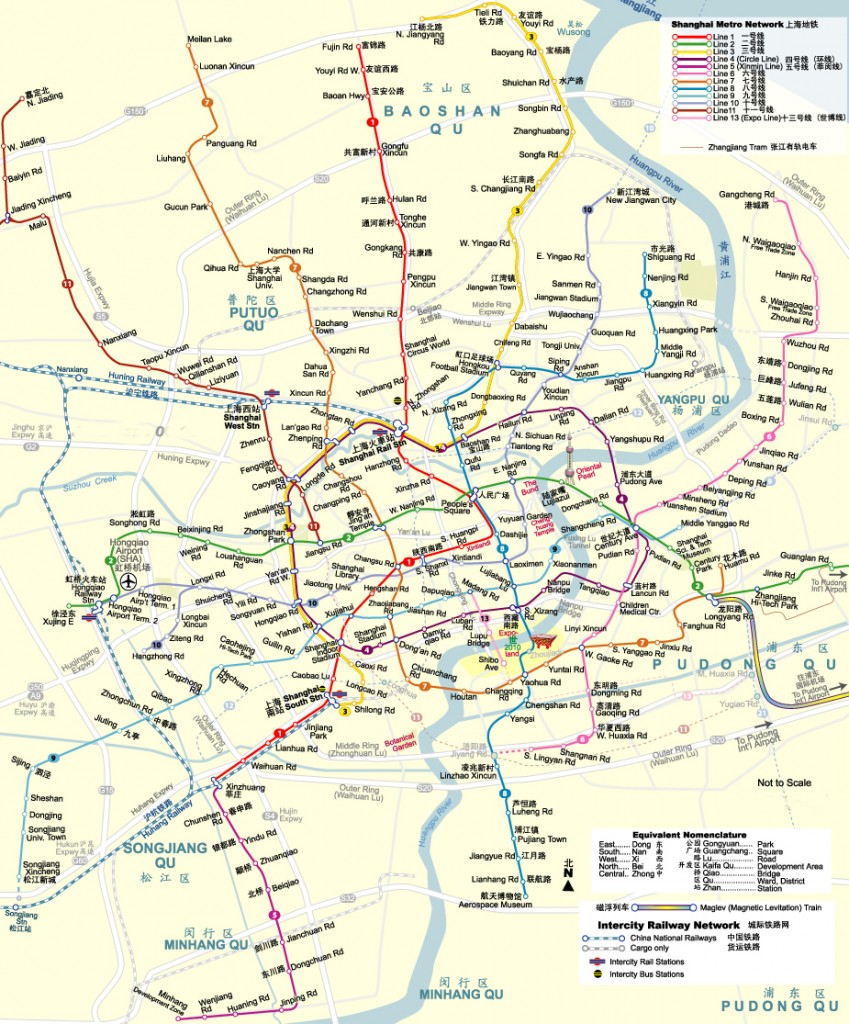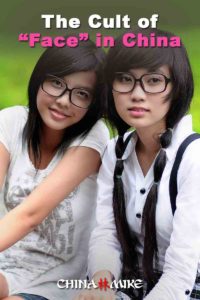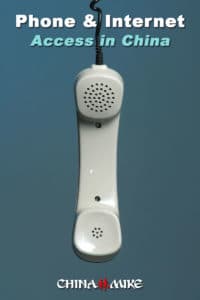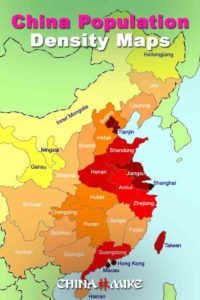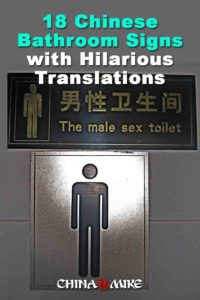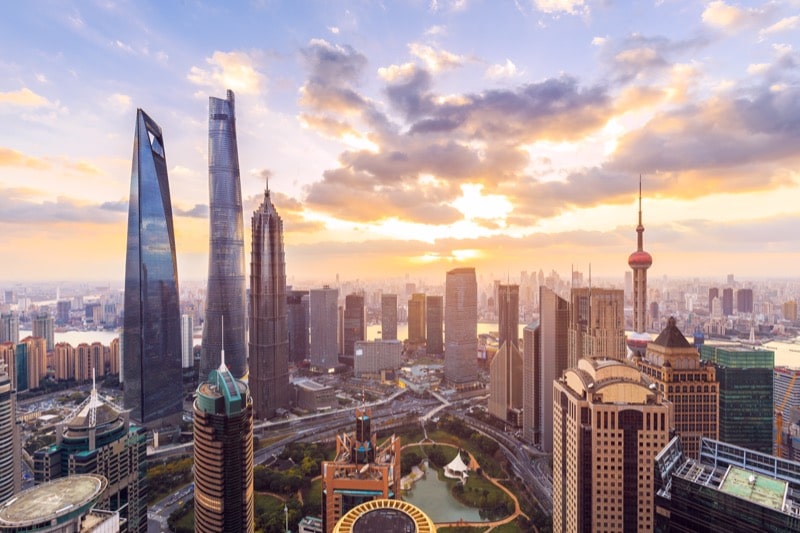The post Best VPN for China (and Why You Need One) – July 2025 appeared first on China Mike.
]]>It doesn’t matter whether you’re coming as a tourist, a student, an English teacher or even to do business, the need for a Virtual Private Network or “VPN” in China is universal. At this point, China censors so much of the internet that it affects every single foreigner who enters the country.
Personally, I’ve used a VPN in China for many years, and it has been important to give me access to my corporate email (which is Google-based), VoiP calling, and even the guilty pleasure of social media (Facebook, Instagram, etc.).
That’s why it’s important to find the best VPN for China
Without a VPN, all of these services would be inaccessible in China.
Before we go too far, if you’re simply looking for a recommendation of a VPN that works in China, I’m going to point you in one of three directions: ExpressVPN, NordVPN and/or Surfshark.
Personally, I pay for subscriptions to all of these VPNs (two act as backups), and I recommend them all as the best VPN for China because they’ve worked consistently here.
They each also offer 30-day money back guarantees in case you don’t like them.
As you read down further, this short table of contents will show you that we’re going to cover:
- Why do you need a VPN for China?
- China VPN Tips – Understanding the internet in China.
- Reviews of the Best VPNs for China
- ExpressVPN – Best overall VPN for China
- NordVPN – Fastest VPN for China
I hope you’ll find my decade of experience useful as you do your research on the best VPN for China in 2025!
*Full Disclosure* Some of the links in this article are affiliate links, which means that I may receive compensation if you choose to use services listed here. I don’t recommend anything I don’t personally use, however, and I’m very grateful for your support to keep this site free!
Why Do I Need a VPN in China?
This is a great question: do you really need a VPN at all when entering China?
My answer is typically a resounding yes.
However, I admit that’s because I want to access websites and apps that are blocked in China like Instagram, Gmail, WhatsApp, and YouTube among the hundreds of others.
But let’s be honest – access to these email and social sites isn’t absolutely necessary.
I’ve lived without the internet for a few months before and, believe it or not, I didn’t die.
If you think you can stomach a few weeks without sharing updates about your trip on social media, I do see tons of value in finding your inner zen through a technology detox while traveling through China.
Consider this, though: Countries like China have popularized the use of VPNs for the purpose of evading censorship.
But the real reason for a Virtual Private Network is…
Security
As you travel outside of your home country, much of the internet you use will be connecting to public WiFi.
Whether you realize it or not, these public connections are often NOT secure and leave you vulnerable to hacks, stolen passwords, and worse.
VPNs were developed to encrypt your data so that no matter where you’re connecting from, the data you transmit (banking info, passwords, emails) remains private.
It’s just an added bonus that this technology also help you tunnel past internet censorship! 🙂
If you’re still with me, I imagine you’ve decided you need a VPN. So, now let’s go over the basics of the best VPN for China.
China Internet Basics and VPN Tips
After having run an online business in China for many years, I’ve learned a lot about how to cope with China’s internet and how to find/use a good VPN. Hopefully, you’ll find these tips valuable as well.
So, let’s go through these four tips one-by-one to bring you up to speed.
Tip #1: China’s Internet Isn’t Centralized
Most people I speak with see China’s internet – or any nation-state internet – as a centralized system, meaning they think it’s all controlled through a single entry/exit point somewhere in Beijing.
Unfortunately, that’s not the case. While officials in Beijing certainly set the tone and make orders about what should be blocked and censored, it’s really up to the provinces and counties to police their own internet.
What does this mean for you, a traveler in China?
It means that the internet across China isn’t uniform and what opens and works in one city doesn’t always open and work in another. It also means that the IP addresses for some VPNs (which is the way they connect to the outside world) might get blocked without any warning.
It’s important to find a VPN that focuses specifically on the China market.
It’s no secret that the Chinese government doesn’t approve of VPNs (even though its government officials may use them). To prevent ordinary Chinese citizens from using VPNs, the Chinese government is always re-tweaking its Great Firewall whenever a VPN provider manages to dig a hole through it.
I’ve often described the relationship between the Chinese government and VPN providers as one that is always fighting a war of attrition.
China’s Great Firewall (censorship) is always updating and changing.
The best VPNs for China are dedicated to responding to these changes. They are well-staffed with teams focused on consistently develop improvements to their software to get you over the Great Firewall.
Anyone else in the VPN market not focused specifically on China cannot keep up with the Chinese government’s own tech improvements to its Internet censorship.
Tip #2: Free VPNs and Proxies Suck
Often times, I get emails from travelers asking me if a good free VPN will work in China. My answer is always the same…
Free VPNs and proxies suck in China (and they’re dangerous)
Remember that China is always revamping the Great Firewall to restrict content it deems sensitive for its citizens. The investment to make the Great Firewall ever taller is tremendous.
With that said, do you think free VPNs can make enough money to pay good engineers to compete with the Chinese government?
Hopefully you’re nodding with me in agreement. If not, you’re welcome to try your free VPN of choice, but be warned that it likely won’t work when you arrive in China.
Or if it somehow does, a free VPN will likely sell your information to the highest bidder.
Tip #3: China’s WiFi Often Requires a Chinese Phone Number
I get a number of people who write and ask about how easy it is to use WiFi in China.
The good news is that China’s WiFi network is growing at an amazingly rapid pace. Airports, coffee shops, and shopping malls are usually all providing free WiFi.
But there’s a catch.
Usually, these WiFi networks require a mobile text-generated passcode in order to log on. If you don’t have a Chinese phone number, you can’t use the WiFi.
There are ways to use your phone in China or to purchase a Chinese phone number, but just be aware that not all WiFi will allow you to connect in China.
Tip #4: Install a VPN on all Your Devices BEFORE Leaving for China
My last piece of advice for you is to sign-up and install your VPN on all devices and phones before you leave for China.
In recent years, the Chinese government has blocked all VPN provider websites to limit its citizens from accessing the Internet beyond the Great Firewall.
VPNs have responded by randomizing their URL connections, but it’s still a risk to arrive in China and hope you can download and install a new VPN.
So, do yourself a favor and make sure you download and install your VPN for China on all your devices before boarding your plane!
China Mike’s Recommended VPN for China in 2025
Now having gone through all my top tips, I want to share with you what I consider to be the best VPN for China.
These are also VPNs I have used in my daily life for years and continue to trust.
ExpressVPN – Recommended VPN for China (3 Months Free!)
You’ll often read in the news each year when China’s People’s Congress convenes that the Internet is under tight lock down bringing all VPNs out of service.
Well, while lots of VPNs have gone out of service during these points in time, ExpressVPN has consistently worked at keeping foreign expats connected to the outside Internet.
For me, that’s a true testament on how reliable ExpressVPN is for China and the high-speeds you see when using the service is another perk that distinguishes it from the competition.
ExpressVPN is also super easy to install and when you’re incredibly busy planning your trip to China, not having to worry about configuring the VPN on your multiple devices is a huge win.
Although I’ve had troubles with ExpressVPN like with any service I’ve used, it’s consistently been reliable over the past few years.
Special Discount: If you want to try ExpressVPN, they have offered a special deal for readers of China-Mike. If you use this link to visit ExpressVPN, they will give you 3 months free on an annual plan!
NordVPN – Recommended VPN for China (up to 75% off)
Remember when I was telling you that you need a VPN that is focused on the China market?
NordVPN is among those providers.
NordVPN is well aware that China’s Internet restrictions vary across the country and has created its Obfuscated Servers feature to account for this and keep you connected to VPN servers from China.
They are also quick to adapt whenever the Chinese government makes upgrades to the Great Firewall, which checks my selection criteria box that your VPN provider should have a dedicated team to respond to improvements in the Great Firewall.
Having used NordVPN for many years now, I’ve always been satisfied with their service and really enjoy the look and feel to the NordVPN apps.
NordVPN is always running their own specials, which sometimes include NordPass, which is a password manager app worth trying.
Surfshark VPN – Unlimited Devices
The strength of Surfshark is its (relative) obscurity.
While popular VPNs like ExpressVPN and NordVPN often find themselves the target of China’s censorship, that’s not always the case with smaller or up-and-coming VPNs.
Surfshark is a VPN that offers all the same features that you’ll get with the other two VPNs (kill switch, no logging, high encryption, etc.). The difference is that they allow for unlimited simultaneous connections.
If you’re having trouble with another VPN in China and want to try something different, I recommend Surfshark as an option.
Surfshark offers a 30-day money back guarantee, so you can try risk-free.
Bonus: Astrill VPN – Most Reliable China VPN
For as long as I’ve been in China (which is more than a decade!), Astrill has been a go-to option for expats wanting to access the uncensored internet in China.
As with each of these VPN services, it’s been through it’s share of times when it’s working well vs times when it hasn’t.
In general, however, Astrill has a record of providing the most consistent, un-interrupted connection status for a VPN in China. I don’t use it as my primary VPN, but it has made for an excellent backup that almost always works when my primary fails me.
They’re not the cheapest, and they have premium add-ons that add even more to that price, but if ExpressVPN and NordVPN have failed you, this is definitely worth a shot.
Astrill generally doesn’t provide discounts, other than the price break when you purchase an annual plan.
Which is the Best VPN for China?
You don’t have to let China’s Great Firewall prevent you from accessing your favorite websites and apps in China. Instead, take my tips and suggestions and sign up for the best VPN for China in 2024.
ExpressVPN, NordVPN and Astrill have rarely let me down and Surfshark has been a wonderful addition to this list for me. I can always count on their service to get me beyond the Great Firewall.
A VPN is one of many recommended China travel resources here on China Mike. Make sure you check my list so you don’t forget something that you didn’t realize you needed to have ready!
The post Best VPN for China (and Why You Need One) – July 2025 appeared first on China Mike.
]]>The post Printable Shanghai Metro Map appeared first on China Mike.
]]>Below are a few helpful subway maps you can use to either save to your device or print off.
In either case, you’ll want to click the image below to get the full-size image, and then either save or print based on your preferences.
Enjoy and while you’re planning your trip, be sure to check out what to do in Shanghai as well as the nearby tourist town of Suzhou.
Shanghai Metro Map
One thing you’ll notice as you look at the Shanghai metro map is how complex it is. The city is so large, there are a crazy number of subway lines!
Don’t be afraid. You’ll only end up using a few of these metro lines.
And in some cases, it’s probably better to use your phone in China to access maps to give you directions.
The Shanghai Subway Map above shows the most up-to-date subway lines in the city (as of 2024), although this is constantly changing with new construction.
Thankfully, the city offers an official Shanghai metro website in English that you can visit to check for any changes that have happened.
Tips for Visiting Shanghai, China
As you can tell from this Shanghai metro map, Shanghai is a HUGE city.
Much larger than you’ll be able to cover in a single trip, trust me.
It pays to prepare well for your trip to make sure you hit all the sites that you want to see in the amount of time you’ve given yourself.
- Do you want to visit the Bund?
- Do you want to see from the top of China’s tallest building?
- Do you want to explore Shanghai Disney?
The best thing you can do to prepare is to purchase a good Shanghai travel guide book and then do your research to know what you want to do.
I’ve included a list of some China Mike recommendations below.
Enjoy your trip and I hope this Shanghai Metro Map was useful!
The post Printable Shanghai Metro Map appeared first on China Mike.
]]>The post China Money Tips 2025 | Currency, Exchange, & ATMs appeared first on China Mike.
]]>This guide will walk you through the best (and cheapest) ways to get money while you’re in China, how to exchange any foreign currency you have, and China money tips you need to know to pay for things easily.
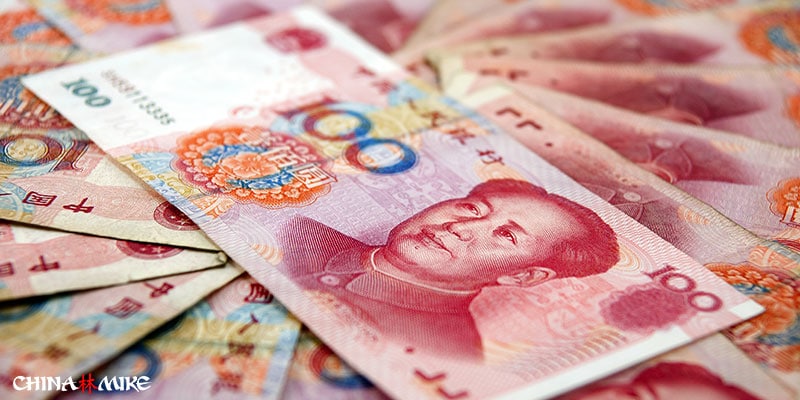
For all intents and purposes, China is a developed country and the Chinese currency is both stable and strong.
No matter where you are in China, you will find a wide range of banking services including bank branches and ATMs. That’s not to mention the exchange services available at international airports, high-end hotels and even some luxury shopping malls.
In this simple guide to money in China, we’re going to cover the following topics:
- Overview of the Chinese currency
- Cash vs Card vs Mobile Payment
- Exchanging Cash vs Using an ATM
- Banks in China
- Can you still use traveler’s cheques?
My hope is that this will answer your most pressing questions about money in China. Also, I hope to give you confidence as you enter China that you’ll be able to pay for everything you need.
Note: Some of the links in this article are affiliate links, which means that at no extra cost to you, I may be compensated if you choose to use some of the services listed here.
Overview of Chinese Currency (Renminbi)
Mainland China’s currency is the renminbi (人民币), which is often shortened to “RMB”. The literal translation for this is “the people’s money”.
When talking, however, most Chinese people refer to units of money as yuan or kuai (pronounced “kwye,” which rhymes with “sigh”).
When in China, you’ll deal mostly with paper bills as opposed to coins. The most common bill denominations are: 100, 50, 20, 10, 5, and 1 yuan.
For more information, read this complete guide to Chinese currency.
Counterfeiting used to be a big problem in China, but extremely harsh punishments (i.e. death penalty) have discouraged the practice.
Old habits die hard, though, and you’ll still see merchants inspect your bills from time to time. This is especially true of the 100 RMB note, which is the only common scam in China you’ll find with using cash.
For years, the Chinese government pegged the yuan to the dollar at about 6.8yuan = US$1, which has helped their export-driven economy grow.
In June of 2010, the Chinese government — under pressure from the U.S. for complicated reasons involving trade deficits – agreed to make the yuan more flexible (but it’s basically remained the same, more or less).
Hong Kong and Macau have retained their separate currencies. The Hong Kong dollar (HK$) is pegged to US dollar at rate of HK$7.8 = US$1. The HK$ can be used in Macau and China’s Special Economic Zones (SEZ) in Shenzhen, just north of Hong Kong. Unlike the yuan, the HK$ can be exchanged internationally.
Methods of Payment (Cash/Card/Mobile)
It’s amazing how times have changed in China. It used to be that cash was king.
Now, everything has migrated to mobile payments.
There is one thing that has stayed the same in China, though. Credit cards still aren’t widely accepted.
Let’s cover the three most important methods of payment you can use in China.
Using Cash in China
Even though almost everybody in China has migrated to a mobile payment system, cash is still readily accepted.
As a tourist or short-term visitor, cash still is your best option when shopping for anything in China. It’s only as a long-term expat that you can consider other forms of payment.
Thankfully, it’s easy to get cash at the numerous ATMs throughout every city (more on that below) or you could exchange your foreign currency at the airport.
Using Credit Cards in China
While foreign credit cards can be used to purchase flights, trains and hotels online, there aren’t too many places that accept your card in person.
It’s better to arrive in China assuming that you won’t be able to use your credit card easily.
Perhaps you’ll be pleasantly surprised, but most people find that they rarely use their foreign issued credit/debit cards.
The only exception: ATMs.
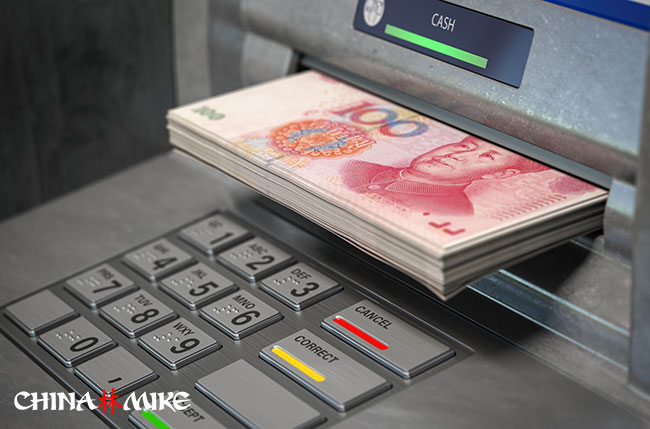
Many (but not all) ATMs accept Visa/MasterCard that will allow you to withdraw money from your account at home. The ATM will spit out Chinese RMB and your bank will charge you an exchange fee.
Do your research: some banks don’t charge ATM fees or foreign exchange fees. If you’ll be in China for a while, reducing these fees could save you a lot of money in the long run.
Mobile Payment in China (WeChat / Alipay)
In China, you’ll find that most locals pay for things using their phones. More than likely, they’re using either WeChat or Alipay to make those payments.
It doesn’t have to be a large payment, either. Mobile payments can be used for large purchases or even to buy a piece of fruit from a street vendor.
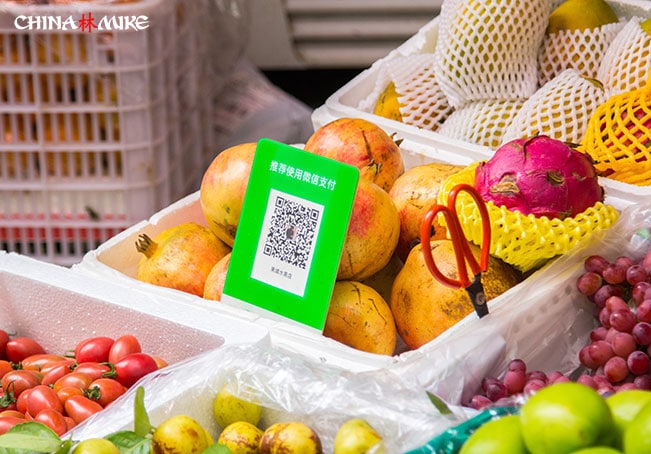
The problem here is that you can only use these apps if you have a Chinese bank account.
Short-term visitors can’t open a Chinese bank account.
Over the past couple years, both WeChat and Alipay have made an effort to make their platform available to tourists, but so far those efforts have been a failure.
The only alternative that shows promise is a UnionPay card.
Exchanging Cash vs Using an ATM in China
As mentioned above, your best bet for cash is to pull out money from an ATM machine. It offers a good rate and it’s extremely quick.
The only downside is that you’ll typically be charged a foreign exchange fee by the Chinese bank, as well as a fee from your own bank. For this reason, I recommend you withdraw the maximum amount, which in many ATMs is up to 3000 RMB or about US$420.
You’ll be surprised at how easy it is to find an ATM that accepts foreign credit and debit cards in China. They’re practically everywhere.
Another tip to remember is that you’ll need to know your PIN in order to get cash from your debit or credit card. Make sure you know what it is!
What about Exchanging Foreign Cash?
Many travelers are under the impression that exchanging foreign cash is a good option.
It works, but it’s not a simple process.
Major currencies are accepted and exchanged at major bank branches, but it’s a time-consuming process that requires you to stand in line and show your passport.
It’s possible to exchange cash at kiosks in the airport or at high-end hotels, but the exchange rate you’ll get is terrible. For this reason, I only recommend this method for emergency cash.
Finally, you can also exchange cash on what’s known as China’s “black market”. Although the exchange rate you’ll get is probably on par with banks, it’s a risky transaction and one that isn’t necessary with all the ATMs available.
Recommended Chinese Banks
Whenever possible, use ATMs operated by the largest banks that you can find.
In Hong Kong and Macau, major banks and ATMs that accept international cards are everywhere (I prefer HSBC Bank, which is the biggest player in town).
In mainland China, your best bets are:
- Citibank, with offices in Beijing, Shanghai, and Guangzhou, has ATMs that accept wide range of cards.
- Bank of China— which has most extensive network in the country and accepts most foreign cards. English instructions should automatically appear on screen. They have ATMs and branches everywhere but here are some main branches if you need other banking services:Beijing: Asia Pacific Building, 8 Yabao Lu, Chaoyang district, 100020, 1 Fuxing Men Nei Dajie, 100818
- Other major nationwide banks: Industrial and Commercial Bank of China, China Construction Bank, Agriculture Bank of China, and China Merchants Bank.
Traveler’s Cheques in China?
Although traveler’s checks have historically been considered the safest way to carry large sums of money internationally….they’re definitely NOT the most convenient in China
Good luck finding a bank in China that still accepts these cheques. (most don’t)
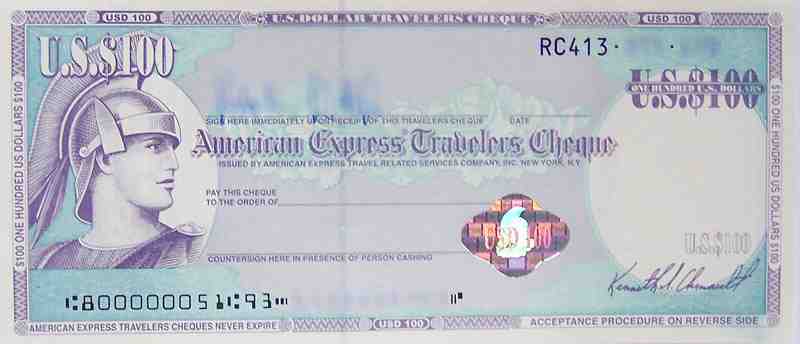
In my humble opinion, if you have a backup ATM and credit cards, traveler’s checks aren’t worth the hassle.
If you do decide to use them, keep your proof of purchase slips in case of loss or theft, as well as your slips so you can re-convert any leftover RMB at the end of your trip.
Finally, forget about wire transfers—they take several weeks and a lot of paperwork and patience. If you’re in dire straits, you’re better off wiring money to China through a service like MoneyGram.
They’ve got offices around the country, (often located in post offices). Again, don’t forget your passport.
Final Thoughts on Money in China
It’s getting easier and easier to pay for things in China, thanks to advancements in mobile payments and international ATMs.
However, for most short-term travelers, the best method is still cash. Pulling cash from an ATM is the easiest, cheapest option for most people.
Finally, you can forget about using mobile payment options or traveler’s cheques. Neither are good options for travelers right now.
The post China Money Tips 2025 | Currency, Exchange, & ATMs appeared first on China Mike.
]]>The post Travel Insurance for China 2025 | Do You Need It? appeared first on China Mike.
]]>Somebody once shared this quote with me, and after over a decade of travel experience, I couldn’t agree more. I know that travel insurance for China might seem like a waste of money at first, but I know too many personal stories to know that it’s not.
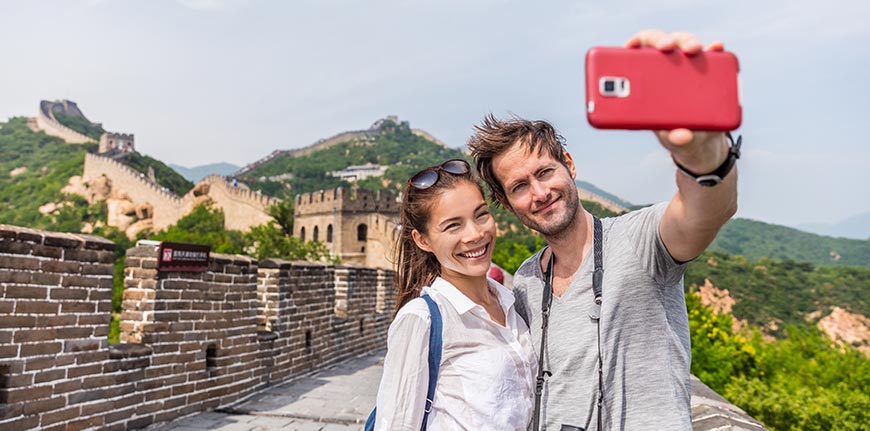
It doesn’t matter if you’re only planning to visit the touristy parts of the Great Wall or you want to hike for days along old parts of the Wall.
Investing in good travel insurance doesn’t just help you, it’s gives peace of mind to your family and friends back home as well.
I’d like to spend a couple minutes sharing my experience purchasing travel insurance and the stories that have prompted me to recommend it to anybody who travels internationally.
Use the links below to jump ahead to a certain section, or keep scrolling to read more:
- Why get travel insurance for China?
- The different kinds of travel insurance
- Tips for researching travel insurance
- Recommended travel insurance companies
If there’s one thing you take away from reading this, I hope you understand the value and benefits of getting travel insurance for China.
Note: Some of the links in this article are affiliate links, which means that at no extra cost to you, China Mike may be compensated if you choose to purchase insurance. I only recommend what I personally use and whether you use my links or not…please purchase travel insurance.
Why Travel Insurance for China?
China is generally a very safe country. And insurance costs money.
So it’s natural for most people to ask why they would need travel insurance for China.
I’ve been using World Nomads for my insurance coverage for years, but I have a few friends who have opted not to have insurance and it didn’t go well.
*Obviously, the names below have been changed to protect my friends.*
- Example #1 – Bob: Bob’s problem isn’t unique. My friend Bob traveled to China in 2019 and experienced an all-too-common flight delay. This delay made him late for another flight, which made him miss his hotel, which…on and on and on. Without insurance, he had to pay for all of it himself.
- Example #2 – Janice: My friend Janice is an older lady (57 years old) who came to China for a Yangtze River cruise. While on the boat, she had a minor stroke and got stuck in a random Chinese hospital without medical coverage. Her family had to raise the US$45,000 to pay her bills and get her back home. All of this could have been avoided with insurance.
- Example #3 – James: James came to China as a 22 year old nomad exploring the world. On his 3rd day in China, he had his wallet, camera, money and passport stolen from his hostel room. Because he didn’t have insurance, he had to beg for money from friends in China and family back home. He never recovered his camera.
I could go on and on with stories I’ve seen over the past decade or so, but hopefully you get the point.
Insurance isn’t just for people who are sick.
Insurance is a safety net for worst-cast travel scenarios.
Different Kinds of Insurance for Travelers
Travel insurance is a good idea — most travelers need the peace of mind of having their bases covered in the unlikely event something goes wrong.
But as you can imagine, when it comes to insurance, there’s a wide range of options to choose from.
You can find any combination of travel insurance plans and providers to cover you for a variety of risks including:
- Trip Protection or “cancellation coverage,” which reimburses you if you cancel your trip due to illness, death in the family, or some other unforeseen delay or events (e.g., airline strike, Icelandic volcano, etc).
- Medical/Emergency Coverage: Can include everything from covering hospital/dental bills to emergency evacuation to accidental death and dismemberment policy.
- Evacuation Coverage: Some insurance includes evacuating to a better hospital in another country, returning you to your home country or repatriating your remains if you pass away.
- Luggage Coverage: Covers you if your baggage/property is stolen or lost.
Which kind of travel insurance do you need for China?
It really depends on what you need – there is no “one size fits all”. At the very least, I recommend you consider emergency medical coverage.
The last thing you want is to be stuck in a Chinese hospital without the money to pay your fees and exit the country (it’s happened before!).
Tips for Buying Travel Insurance
Travel insurance can feel like a bit of a complicated mess. I’ve used it before, so I know!
That’s one reason a lot of people tend to shy away from buying it, even though there are tons of great reasons to get travel insurance for China.
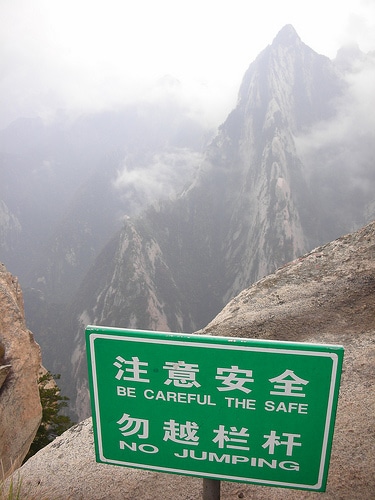
Here are a few tips to consider as you’re doing your research on the best travel insurance for your China trip:
- Check to see what you’re covered for under your existing medical policy. For instance, BlueCross BlueShield actually has worldwide network of providers that includes Hong Kong and Beijing. Similarly, credit cards also provide a lot of travel-related services that most travelers don’t know about. Although this is helpful, the fact is that it usually isn’t nearly enough for what you’ll need.
- Determine your exact needs first. Travel insurance has gone from one-size-fits-all to a la carte so you’ll have a lot of flexibility to customize your plan. For example, with World Nomads (the travel insurance company I use), you can tailor your plan based on whether you expect to take part in any high-risk activities like bungee jumping.
- Read the fine print. For instance, unlike World Nomads, many travel insurance companies don’t cover high-risk activities such as certain adventure sports & activities (or will charge higher rates to include them). Others won’t cover people age 60 years or older. Also, many policies won’t cover you if you did something bone-headed while you were drunk.
- At the very least, consider “evacuation insurance.” If you get sick or injured, you’ll be flown home or to the whatever nearby medical facility your insurer deems necessary. For example, American Express’ Global Travel Shield offers an annual plan at about $60.
Keep these tips in mind as you look at the various travel insurance companies I list below. There is no “best travel insurance company for China”.
You’ll need to consider exactly what they provide and match it against what you need.
Recommended Travel Insurance Companies for China
Travel insurance is an extremely customizable service.
For this reason, I’m not going to tell you that one company is better than another. Instead, I’m going to list the most reputable companies that serve travelers and expats in China.
- World Nomads
- Safety Wing
- Travelex
Allianz(no longer recommended)
I encourage you to do your own research and get quotes from them directly, but you can be confident that these quotes are fair and the service will be good.
World Nomads – Most Popular Travel Insurance for Active Travelers
World Nomads is one of the most reputable companies in travel insurance for China.
This is especially true if you’re an adventurous traveler who wants to get off the beaten path. World Nomads is one of the few companies that covers what are known as “higher-risk” activities.
At the very least, it’s worth getting a quote from World Nomads to see what they can provide you during your trip to China.
Safety Wing Travel Protection
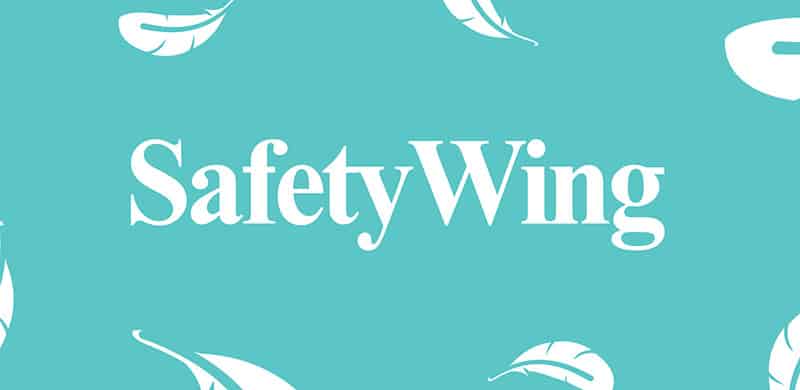
What makes Safety Wing a great option is their focus not just on nomads, but also on the remote work force.
So whether you’re traveling to China for a quick trip or it’s just a stop during your work around Asia, they offer insurance protection for you.
Unlike other insurance providers, Safety Wing was built and designed specifically for nomads and travelers, so it’s worth getting a quote to see how they compare to the more traditional options.
Travelex Insurance for China Travelers
Travelex Insurnace not only offers some of the same coverage that both World Nomads and Allianz do, but they also pre-existing condition waivers.
Many times, pre-existing conditions aren’t covered with travel insurance. That’s not always the case with Travelex.
Check to see what kind of coverage premiums they provide by getting a free quote:
Allianz Insurance (No Longer Recommended)

UPDATE 2025: I no longer recommend Allianz to travelers. During the COVID-19 pandemic, they left travelers high and dry and refused to help them.
Allianz is used to be a trusted name in the insurance industry.
They offer a number of plans for single trips, multi-trips and rental cars, depending on what you plan to be doing. Most plans are offered a basic level, prime level or premier level.
Unfortunately, with the global epidemic in 2020, their true colors were shown and I can no longer recommend them as a service.
Final Thoughts | Travel Insurance for China
Again, travel insurance for China isn’t about your health. It isn’t even about how risky your travel is.
Travel insurance is a means to protect you against the worst-cast scenario.
At the very least, get a quote from one (or all three!) of the travel insurance companies I listed above to see what they offer.
Whether you use my links or you Google it on your own, I honestly don’t care. All I care about is that you get travel insurance before you leave.
The post Travel Insurance for China 2025 | Do You Need It? appeared first on China Mike.
]]>The post The Cult of “Face” in China | 面子 appeared first on China Mike.
]]>It’s a complex concept that is important to grasp if you want to really understand Chinese culture. Here’s what you need to know.

Of all the idiosyncrasies of Chinese culture, the concept of “face” is perhaps most difficult for Westerns to fully grasp.
Because “saving face” is such a strong motivating force in China, it’s also one of the most important concepts in understanding the Chinese Mind.
As we dive deeper into this concept, we’re going to cover the following basics:
- Defining Face to a Western Audience
- Cultural Context of Face in China
- How to Operate within the Reality of Face
- Tips for Giving and Receiving Face in China
The goal in the end is that you’ll not only better understand the concept of face in China, but you’ll also be able to see how it influences the way you relate to people and do business in the country.
How Do You Define “Face” Exactly?
As a sociological construct, the Chinese concept of face is difficult to define.
The famous Chinese writer and translator Lin Yutang (1895 –1976) even went so far as to say that “face cannot be translated or defined.” He did, however, characterize it as “…abstract and intangible, it is yet the most delicate standard by which Chinese social intercourse is regulated.”
The closest translations are along the lines of “pride”, “dignity” or “prestige”.
But these don’t tell the whole story.
Face-management is much more than just impression management (or “protecting and enhancing your ego”) in the Western sense. Of course, no one — regardless of culture—wants to look bad or have their ego bruised. But the Chinese concept goes beyond the narrow Western concept of face (and is perhaps closer to the Arab concept of “honor”).
It’s also worth noting that the concept of face in China is vastly different than the concept of “guanxi” in China. Although both are equally important to understand.
Comparing Western Ego vs. Chinese Face
Unlike “Western face”– which is more self-oriented and individualistic — Chinese face is more other-directed and relational.
In other words, it’s less about your own personal pride or ego, and more about how one is viewed by others. Unlike Western face, Chinese face can be given or earned. It can also be taken away or lost.
Chinese face can be given or earned…it can also be taken away or lost.
As a general sociological statement, Western cultures tend to focus on the individual as an independent, self-reliant being. In raising children, the focus is on helping them develop a strong sense of personal integrity and individuality (misbehavior is often blamed on lack of self-esteem).

In contrast, for some 4,000 years, Chinese culture has downplayed the concept of the individual—instead emphasizing the supremacy of the family and group.
It was all about bringing honor to your clan. With the emphasis on the collective, the sense of self blurred so much that it practically didn’t exist. In fact, individualism was seen as immoral.
The point is that Chinese face can be communally created and owned. In 2008 study Cultural ‘Faces’ of Interpersonal Communication in the U.S. and China, Yvonne Chang of the University of Texas explains:
“Deeply rooted in the Chinese concept of face are conceptualizations of a competent person in Chinese society: one who defines and puts self in relation to others and who cultivates morality so that his or her conduct will not lose others’ face. This contrasts with the American cultural definition of a person who is expected to be independent, self- reliant, and successful. The end result is that a Chinese person is expected to be relationally or communally conscious whereas an American person is expected to be self-conscious.”
Guilt-Based vs Shame-Based Cultures
Without digging too deep sociologically, suffice it to say that this social phenomenon of face has a lot to do with the teachings of Confucius. He taught that if you lead people “with excellence and put them in their place through roles and ritual practices, in addition to developing a sense of shame, they will order themselves harmoniously.”
Here we see that the flip side of gaining honor is avoiding shame.
Thousands of years ago, China developed into a shame-based culture. This is in contrast to Western cultures, which are more “guilt” or “conscience-based”.
Generally speaking, the Chinese “behave properly” generally to avoid shame and they fear losing face—not necessarily because they might feel badly about their actions.
For many, anything goes….as long as you don’t get caught!
In China, shame isn’t just personal feelings—again, it’s a relationship-based thing that serves as a form of social control. Any sort of family or clan-kinship shame is covered up.
This is also in stark contrast to the US, where airing your dirty laundry and private business on talk shows is seen as socially acceptable (in general, the Chinese aren’t big on updating strangers on their menstrual cycles via Twitter).
Ethics of “Face” in Relation to Truth
Western cultures tend to think in terms of “truth” and “rightness” (where being innocent and right is most important). Westerners are taught to respect objectivity and facts. The law applies equally to everyone the same and our behavior is something that should be directed by our consciences.

In the West, your honor or face is more about your personal integrity. We tend to admire the integrity of those who uncompromisingly face objective truth, regardless of how self-damaging the results may be.
In the US, you can admit and apologize for your shortcomings and gain respect for your honest efforts to learn from the past. Americans are generally forgiving if someone takes responsibility for their problems.
For instance, during his Presidential run, George W. Bush spoke openly about overcoming his addiction to alcohol. This is something that no Chinese official would ever do it—it would be a devastating loss of face and almost impossible to recover from.
In contrast, Chinese society has always functioned on basis of personal relationships rather than objective customs and laws. Indeed, the rule and laws laid down were often to serve those in power (and often arbitrary and ever-changing). Complicating matters, Confucian teachings say that you’re supposed to treat people differently depending your relative statuses.

As a result, Chinese “ethics” has never been based on universal principles of good and bad. Instead, they’re more based on the circumstances of the moment—a system that the West calls “situational ethics” (much to the chagrin of people doing business in China).
Similarly, the Chinese concept of the “truth” is not black or white either. The emphasis is less on always telling the objective “truth,” and more about what the situation and relationship calls for.
When it’s OK to Lie in China
In some ways, this helps explain the cultural differences on lying.
The Chinese will go through great lengths to protect face (their own as well as others). In fact, it’s perfectly acceptable to tell a lie—even a bald-faced one—if it serves to protect face.
China’s culture of shame doesn’t think of lies in terms of “right” and “wrong.” Instead, the goal of Chinese truth is often to protect the face of an individual, group, or even nation. In these situations, both parties can usually read between the lines and know when the “truth” is being re-packaged to help protect face (and they unfortunately will often assume that Westerners will know as well).
For instance, a hotel receptionist might tell you an obvious lie when he tells you that they don’t have any vacancies. This might be their face-saving way to avoid having to tell you that their hotel doesn’t allow foreigners.
Westerners often have a hard time with this. We don’t like to be bull-sh*tted. Our reaction is to call someone out on a lie. But in most cases, open confrontation is counter-productive, and will often result in denials or feigning ignorance.
So I’d recommend not backing your tour guide (or whoever) into a corner and calling them out if you catch them in a lie (it would be viewed as very rude, even cruel). In general, it’s a good idea to leave the Chinese with a way out of any potential face-losing situation.
Instead, if something goes wrong, always talk privately. Try to avoid assigning blame. And use the passive voice, as in: “IT seems as if there’s a problem.”
Flattery can often be very effective too: “I know this isn’t your fault but since you are very smart, what do you think we should do?”
Cultural Context to the Idea of “Face”
The concept of “face” in China is very much a cultural construct, therefore the best way to truly understand it is by seeing it within the context of Chinese society.
China’s “Super Girl Contest” Reality Show
For starters, we can look at the once hugely popular Chinese singing contest called Super Girl Contest, which is basically their version of “American Idol”.
Nearly half of the girls can sing English songs and the competition is just as intense as the US or UK versions….but their response to winning and losing tells us a lot about this Chinese concept of “face”.

Westerners will notice that a disproportionate amount of time of the three-hour show is spent with mutual emotional consoling by the singers, hosts and judges.
In fact, to protect against the shame of being eliminated, the show spends more time focusing on the losers rather than the winners!
And even though they had a version of the tough Simon Cowell in a judge named Wu Qixian, you won’t find him fighting with the other judges. Instead, it’s much more of a love-fest than American Idol—with everyone working hard to help protect face.
Unlike the “win-lose” zero-sum mentality of the US, Chinese reality shows and competitions also typically share the prize money.
For instance, in the 2006 show “Win in China” (the Chinese version of “The Apprentice”), the winner gets 10 million RMB. The runner up gets 7 million and the other three “losers” get 5 million each!
Chinese Idioms About “Face”
Illustrating the obsession with face-management, there are literally dozens of short sayings and proverbs, called Chinese Chengyu, that have to do with “face”.
These idioms give you some incredible cultural context into this idea of face in China.
“Men can’t live without face, trees can’t live without bark.”
人要脸树要皮 – rén yào lǐan, shù yào pí
“A family’s ugliness (misfortune) should never be publicly aired”
家丑不可外扬 – Jiāchǒu bùkě wàiyáng
“Face-Saving project”
面子工程 – Miànzi gōngchéng
For example, “That new expensive airport is just another face-saving project for local officials to suck up to their bosses.”
“Blacken one’s face”
往脸上抹黑 – Wǎng liǎn shàng mǒhēi
For example, “He blackened your face to get you back for what you did.”
A traditional insult is to say that someone “has no face”.
没有面子 – Méiyǒu miànzi
Similarly, one of the worst things is to “lose face”.
丢脸 – Diū liǎn
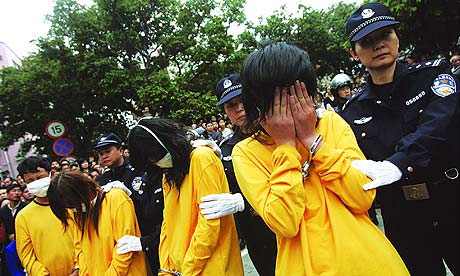
How to Operate within Chinese Face
So now that we understand how to define face and what it means within the context of Chinese culture, the next step is more actionable.
How can we make sure that we “give face” to our friends and colleagues and minimize the risk of “losing face”? Here are a few thoughts on how to operate within the reality of face in China.
How to Gain or Lose Face in China
Warning: Don’t treat this concept of face, or “mianzi”, too lightly. This is especially true if you’re doing business or spending a long time in China.
Foreigners working in China (who don’t appreciate the full cultural importance of face) often complain that their Chinese counterparts are “too sensitive” about being offended or having their feelings hurt.
Similarly, many ex-pats in China—as well as other Asian countries such as Japan, Korea, Thailand, Singapore—can tell you stories of how their local friend suddenly stopped talking to them (probably because they somehow caused them to lose face).

And from the Western perspective, it is true—the Chinese are generally more sensitive to any perceived slights having to do with losing face since it’s so ingrained in their culture. This thin-skin is largely a product of culture that has valued social harmony as the prime rule (and generally avoided criticism).
In the West, many of these slights are seen as minor and quickly forgotten. But in China, failing to appreciate face can cause serious problems.
While an American businessperson might be respected back home for his frankness and being a “straight-shooter,” he would likely be viewed in China as uncultured, overbearing, and rude.
For instance, an American subordinate attending a meeting where his boss is presenting would generally think nothing of raising a question, making an alternate suggestion, or even disagreeing in front of others.
In China, this would be a serious face-losing situation for the subordinate, boss, and even the company. In fact, making someone lose face can sometimes insult someone so deeply as to create an enemy for life.
Losing face can sometimes be so insulting as to create an enemy for life.
Indeed, revenge is very much part of the equation—and not just on Chinese soap operas, which include a heavy dose of avenging face-losing situations. I think it’s safe to say that throughout China’s long history, face has started many unnecessary conflicts.
In terms of practical China travel advice, a loss of face can result in some form of sabotage, non-compliance, or foot-dragging.
For instance, let’s say that you’re frustrated by an employee as you’re applying for a China visa in the US. You start ranting and raving loudly—demanding to see the manager, etc.
Don’t be surprised if your application is “lost” under the bottom of the pile.
Viewing China Through the Lens of “Face”
A better appreciation of face can go a long way in helping visitors better understand China.
For instance, foreigner business people will often notice that Chinese employees will often go to great lengths to steer clear of them. Most chalk it up to “being shy” or their inability to speak English.
That’s just part of it.
For the average Chinese person, talking to a foreigner is scary because it there’s a lot of potential for appearing incompetent and losing face, especially in front of other employees or the boss.
Even though they’re in their own country, many Chinese somehow feel that they’re supposed to know how to speak English when talking to a foreigner (instead of the other way around). Or even if they do speak it, there’s the fear that their English may not be understood, corrected or even laughed at (worse if they’re English majors and it’s part of their job description).
In general, the Chinese avoid situations when others can see them making “mistakes” (such as incorrect pronunciation).
While other Chinese people all know the ground rules governing face, they don’t know what they’ll get with a potentially unpredictable, emotional and loud laowai.
For better or worse, many Chinese have a perception that Westerners easily lose their cool and will fly off the handle at the drop of a hat. Worse, they might’ve personally witnessed or experienced past incidents where an angry foreigner exploded in frustration (leading to a loss of face for all parties involved).
Similarly, the average Chinese person on the street can also be apprehensive when being approached by a foreigner (asking for directions, taking a photo, making conversation, etc). In these situations, you can increase their comfort level by, well, not acting like a loud, back-slapping foreigner (yes, I’m looking at you Americans).
If you want to copy an American, I’d recommend taking John Wayne’s acting advice:
“Talk low, talk slow, and don’t talk too much.”
Pretend that you’re trying to feed a nut to a nervous squirrel–approach at an angle, don’t attract too much attention and no sudden moves.
Preserve China’s National Face
Operating under the construct of Chinese face goes way beyond just how you relate to family, friends and business contacts. In fact, many events in Chinese history can be better understood when viewed through the lens of Face.
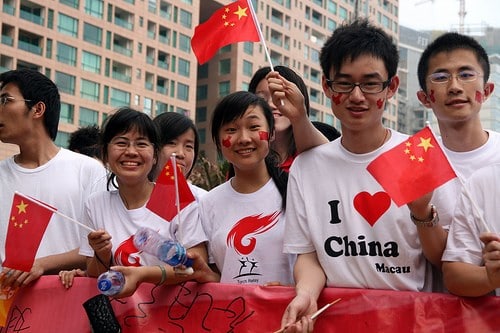
All Chinese children learn about the incredible timline of Chinese history (through the CCP’s version of history nonetheless). The Chinese are keenly aware of their own history of “humiliations” at the hands of foreign powers.
This has resulted in a strong sense of nationalism—almost to the point of defensiveness and over-sensitivity.
On a practical level, avoid any criticisms that might be taken as disparaging (even about the government).
The 2008 Olympic opening ceremony is an obvious example of the importance of building up national face (you could say that it was the ultimate “face project” of modern China). It’s no wonder that they invested so much time and money in wowing the world. Not to mention the pressure on the actual athletes!.
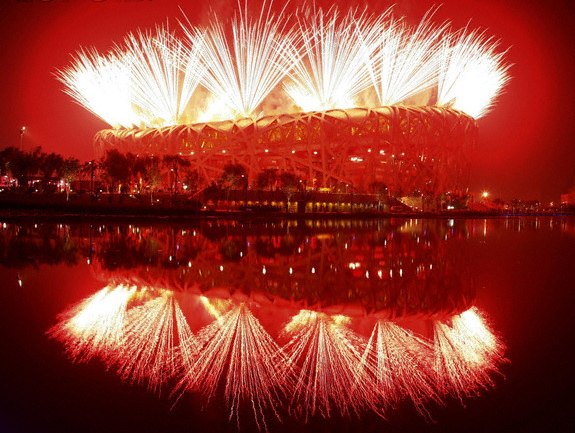
Example: Hu Jintao’s Visit to the U.S. in 2006
Even at the highest levels of government, failing to grasp the symbolic importance of Chinese face can cause problems, intentionally or otherwise.
Take the example of former Chinese President Hu Jintao’s 2006 visit to the US. Even though many of the mis-steps by the US and George W. Bush were probably unintentional, many Chinese netizens who got the real scoop believed that it was an intentional campaign to make China lose face on the international stage (especially since they spend so much thought into face when hosting foreign leaders).
President Hu had insisted on an official “state visit” (the highest form of diplomatic contact), which was given to his predecessor Jiang Zemin in 1997. President Bush didn’t give it to him, instead using the more neutral term “official visit” (Hu’s face was somewhat saved in the Chinese media by translating it as “state visit”). There was also wrangling before finally being given the full 21-gun salute, instead of the originally planned 19-gun salute.
Similarly, Hu was refused a full state dinner. Bush instead gave him only a state lunch (resulting in the fact that the meal wasn’t even reported in the Chinese media). During the greeting ceremony on the White House lawn, the loudspeaker introduced Hu as the president of “the Republic of China” (the official name of Taiwan), instead of the “People’s Republic of China”.
It gets worse. While Hu was giving his official speech, a protester from the banned Falun Gong group loudly heckled him from the stands. It took the Secret Service three minutes to escort her out.
The final act of humiliation occurred at the end as Hu started to leave the platform that he was standing on with Bush. As Hu was about to walk away in the wrong direction, Bush hastily reached out and grabbed Hu by his suit jacket to pull him back on the stand. If the scene occurred between only American politicians, it probably would’ve passed with little notice.
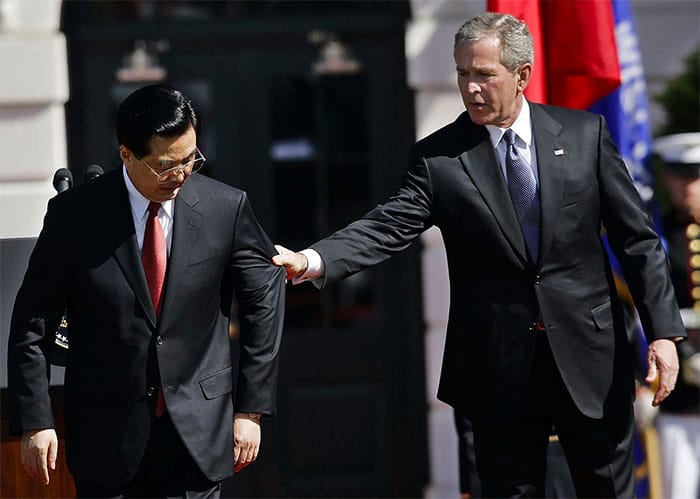
But from the Chinese point-of-view, it was deeply insulting to see their nation’s leader being tugged at and treated like a small child.
In fact, the whole affair was so disastrous from a Chinese face-losing perspective, that the Chinese state media downplayed the visit– preferring instead to focus on Hu’s visit to Bill Gates’ mansion and to Boeing’s massive facilities in Washington State.
In January 2011, Hu finally got his full state visit when he was invited to visit President Obama (along with the 21-gun salute and state dinner). According to Philip M. Nichols, a Wharton professor of legal studies and business ethics, the visit was “symbolically successful”—explaining that “One of the things the meeting accomplished was that President Obama treated President Hu—and by extension the People’s Republic of China—with respect.”
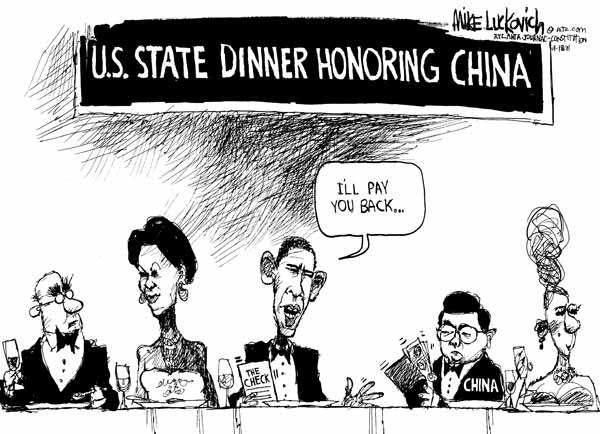
Another Example: 2010 Japanese Boat Incident
When I was living in China in September 2010, the Chinese state media was obsessively reporting on a two-week long spat between Japan and China. If not for face considerations, I doubt that the incident would have received all of the attention that it did.
If you know anything about Chinese history, you’ll know that the worst face-losing events were the Japanese invasions and occupations. Suffice it to say, there’s still very strong anti-Japanese sentiment in China (it’s very safe to say that they’re the most hated nation in China).
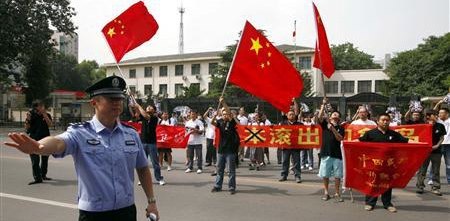
The basic incident: A Chinese trawler collided with a Japanese patrol boat in an area claimed by both countries. The Japanese coastguard let the crew go but arrested the captain. China responded with escalating threats and economic sanctions (even suspending Japan-bound shipments of rare earth metals crucial in advanced manufacturing).
Eventually, Japan let the captain go, although they didn’t give the apology that China demanded (after all, they have their own national face issues to deal with too).
Tips for Giving Face in China
Here are some simple tips to help “give face” to a business counterpart or friend in China.
- Praising someone publicly: This is true especially in front of their elders or boss.
- Giving high marks on customer evaluation forms: The Chinese are generally generous, especially when giving reviews of their teachers.
- Treating someone to an expensive meal or banquet: The most common face-giving technique that makes Chinese business and society run is the big banquet.
- Giving sincere compliments: Make sure that you’re showing that you’re enjoying yourself when being treated out.
- Giving an expensive gift: If possible, the best thing you can give is an imported gift that can’t easily be bought in China.
Avoid These Face-Losing Situations
If at all possible, try to avoid these particular face-losing situations with a Chinese counterpart:
- Openly criticizing, challenging, disagreeing with, or denying someone.
- Calling someone out on a lie.
- Not showing proper deference to elders or superiors.
- Turning down an invitation with an outright no (instead, they usually say “maybe”, “yes, maybe”, “we’ll do our best”, ” let’s think/talk about it later,” or “I need to discuss it with so-and so first”)
- Being late on a flimsy excuse (demonstrates that you don’t respect or take them seriously).
- Interrupting someone while they are talking.
- Being angry at someone –mutual loss of face for both parties
- Revealing someone’s lack of ability or knowledge (such as being able to speak English).

The post The Cult of “Face” in China | 面子 appeared first on China Mike.
]]>The post Using a Mobile Phone and Internet While Traveling In China | China Mike appeared first on China Mike.
]]>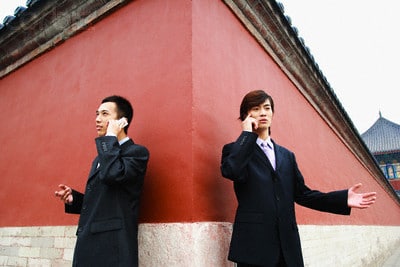
If you have a trip to China planned in your future, you might be worrying and asking yourself, “Will I be able to use my cell phone in China?” or “How will I access the internet in China?” Don’t worry! We’ve got you covered with this article which will address (hopefully) most of your concerns.
It may sound simple enough, but staying connected while traveling in China takes a bit of planning and preparation.
Whether you want to use your phone in China or you plan on only using public WiFi, here’s an explanation of what you need to expect and how you can properly prepare yourself.
Note: Some of the links in this article are affiliate links, which means that at no extra cost to you, I may be compensated if you choose to use one of the services listed here. I only recommend what I personally use, however, and appreciate your support of this free website!
Using Phones in China | Calling, Texting & Data
You’re going to notice when you travel around China that everybody uses a cell phone.
The adoption rate of mobile phones has been crazy in China. The days of funny-looking public pay phones is long gone.

There are still landlines where you can make local calls, but frankly speaking most Chinese people prefer to use a messenger app like WeChat to communicate instead of placing a phone call.
So the question remains:
Can you bring your phone from home to use in China?
Thankfully, the answer to that question is yes, although there are a few different options for you. It’s possible to:
- Use Your Home Carrier’s International Roaming: Check with your home carrier to see what their rates are. Normally, they’ll charge you a set fee per day just for connecting, in addition to any data/calls/texts over a specific limit. Important: If you don’t want to get charged this daily roaming fee, make sure your phone is set to “airplane mode” so it won’t accidentally connect to the Chinese network.
- Buy a Chinese SIM Card: It’s possible to buy a SIM card once you arrive at the airport in China, but it’s often a hassle to get figured out (and not worth it unless you’re living there as an expat). It’s much better to pre-purchase a Chinese SIM card before you travel to China. You’ll still need to supply a copy of your passport to activate the card, but at least you’ll have a working data plan the moment you land in China.
- Rent a Phone: Some travelers – particularly business travelers – avoid connecting their phone to Chinese networks for security reasons. In this case, it is possible to rent a phone for China. Rates are usually cheaper than international roaming but more expensive than a Chinese SIM card.
All of these methods are ways to get your phone connected to Chinese networks.
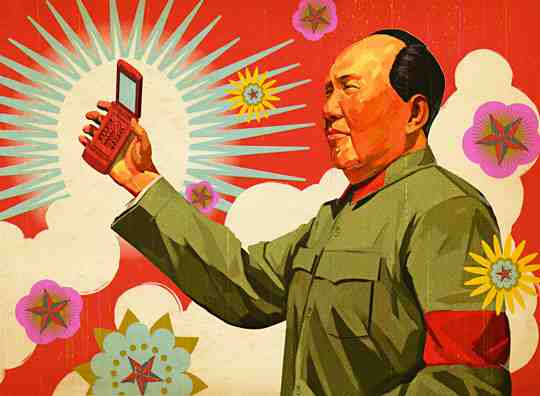
When using a phone in China, it’s good to be aware that their emergency and service numbers are different than what you might be used to.
Here are a few numbers to remember in China:
- Ambulance: Dial 120 (you’re better off taking a taxi to a hospital!)
- Police (Bureau of Public Security): Dial 110
- Directory assistance: Dial 114
- Rail information: Dial 12306
Of course, it’s entirely possible to use your phone and computer only using WiFi instead of network connection.
WiFi in China | Is It Reliable?
I remember the days when the streets of China were lined with internet cafes, each one packed with young Chinese men playing video games for hours on end.
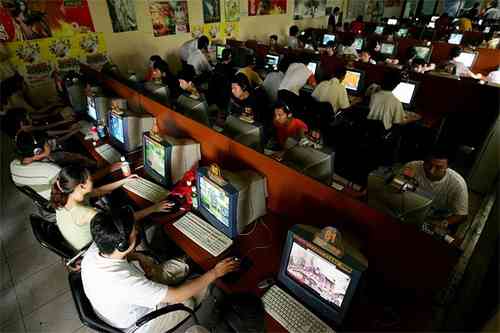
Of course, nowadays most of these internet cafes have shut down. The rise of mobile phones and public WiFi have pretty much put them out of business.
So here’s the good news: China has tons of free WiFi available pretty much anywhere you go. Airports, malls, coffee shops, restaurants…you name it. They probably have WiFi.
And here’s the bad news: Oftentimes, this free WiFi is blocked by a security feature that requires a code to be texted to your phone for verification.
If you don’t have a Chinese phone number that can send/receive texts, you can’t log into the WiFi.
This isn’t the case everywhere, but it is becoming more and more common.
China’s government has become very strict about monitoring the activity of internet users, and the only way to do that is to make sure that they identify themselves even when using public WiFi.
What are your options?
- Plan on only using the free wifi at your hotel, which only requires a password.
- Hope for the best.
- Connect your phone to the network using the methods mentioned above.
- Use a neat device like the Skyroam that gives you international WiFi service for your devices at a very low cost.
It’s possible to only use WiFi in China, just make sure you understand what you’re getting into so you’re not too disappointed.
It’s very important to note that no matter you use your mobile phone connected to a Chinese network or a free WiFi network, you’re still going to run into the big problem here in China…
…censorship.
Internet Censorship & Restrictions in China
Perhaps you’ve heard about the so-called “Great Firewall of China” that the government uses to block certain websites and apps in China.
This includes popular social media sites like Facebook, Twitter and Instagram or popular productivity tools like Gmail, Google Maps and Yahoo.
In addition to blocking sites with pornographic, obscene, and criminal content, it’s no secret that any websites critical of the country, as well as certain sensitive political topics, are also censored.
For the average tourist, internet censorship in China isn’t a huge problem.
The reason for this is a simple piece of software known as a Virtual Private Network, or “VPN” for short.
If you ask any expat who has lived in China for more than a few months, every one of them will tell you that they use a VPN in China.
A VPN allows you to connect to a server outside of China and evade the censorship. There are hundreds of VPNs out there, but these are the three that I recommend:

ExpressVPN (Recommended)
One of the most reliable and popular commercial VPNs on the market is also an excellent option for China.
NordVPN for China
NordVPN has been running in China for a number of years and is effective at helping you get past Chinese internet censorship.
SurfShark VPN
Although Surfshark isn’t as old as NordVPN, it has demonstrated itself to be very effective and extremely cheap.
Certain VPN companies, these two I mention above, are aimed specifically at internet users in China.
They offer mobile apps (iOS and Android) as well as computer apps that allow you to connect to a server outside of China and bypass any censorship.
This means that even in China, you can still use your favorite social media site or check your Gmail. Not to mention the fact that a VPN encrypts your data so that big brother can’t watch what you’re doing.
Final Thoughts | Phones & Internet in China
For some people, it’s important to remain connected to social media and email or to have the ability to call home via Skype while they’re traveling around China.
It’s like travel insurance for China – sometimes you don’t know what you need until you need it.
If this is the case for you, you may need to prepare for ways to use your phone in China and connect to an uncensored internet.
Whether you decide to get a Chinese SIM card, use the free WiFi or bring your own global WiFi device, you’ll want to make sure that you’re prepared for China’s internet censorship.
In this case, I recommend ExpressVPN as an excellent option, or if you’re the kind of person who wants a few to choose from, you can also consider NordVPN and SurfShark as inexpensive alternatives.
Make sure you install them before you leave for China, though.
The reason I say this is that setting up a VPN from within China is a huge pain. As long as it’s set up when you arrive, you won’t have any problems.
The post Using a Mobile Phone and Internet While Traveling In China | China Mike appeared first on China Mike.
]]>The post China Population Density Maps appeared first on China Mike.
]]>As of 2020, there are a total of 1.4 billion people in China. That’s a lot of people to fit into one country!
If you’re searching around for some good China population density maps, you’ve landed in the right place. I’ve curated a collection of the best maps I can find that give a visual representation of this massive China population.
China Population Density Maps
Below is a collection of various maps giving a visual representation of just how many people live in China.
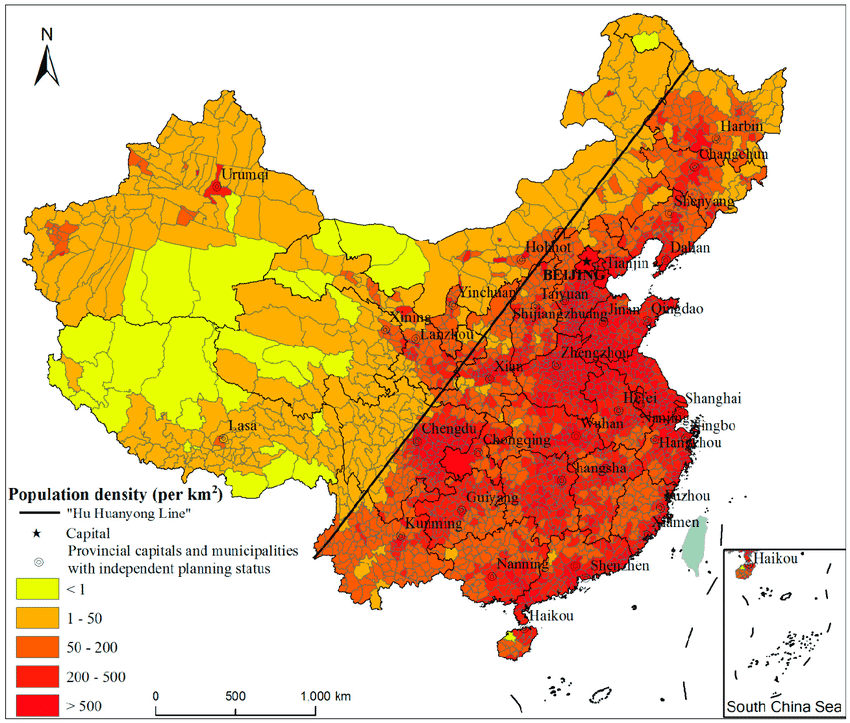
The above population density map of China shows a fluid representation of the density within the country without regard for political division.
This map breaks down China’s population density by region and province.
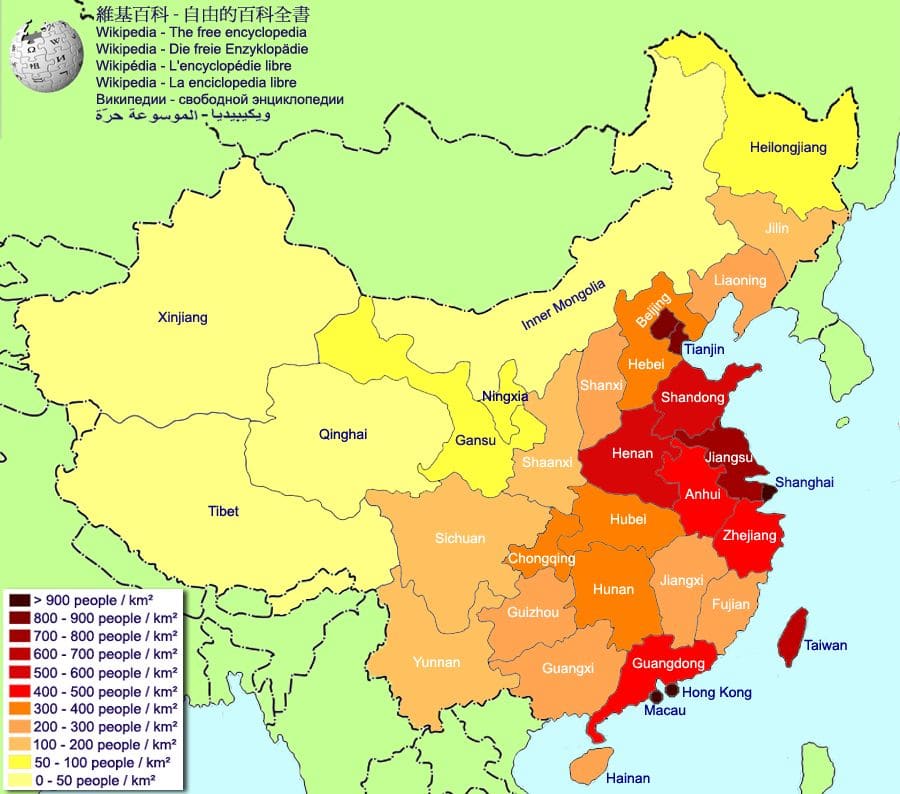
Of course, this might be hard to visualize in the context of the rest of Asia or the world. That’s where these comparison maps come in handy.
Comparing China’s Population Density
When you zoom out and view China’s population density in relation to the rest of Asia, it becomes very interesting.
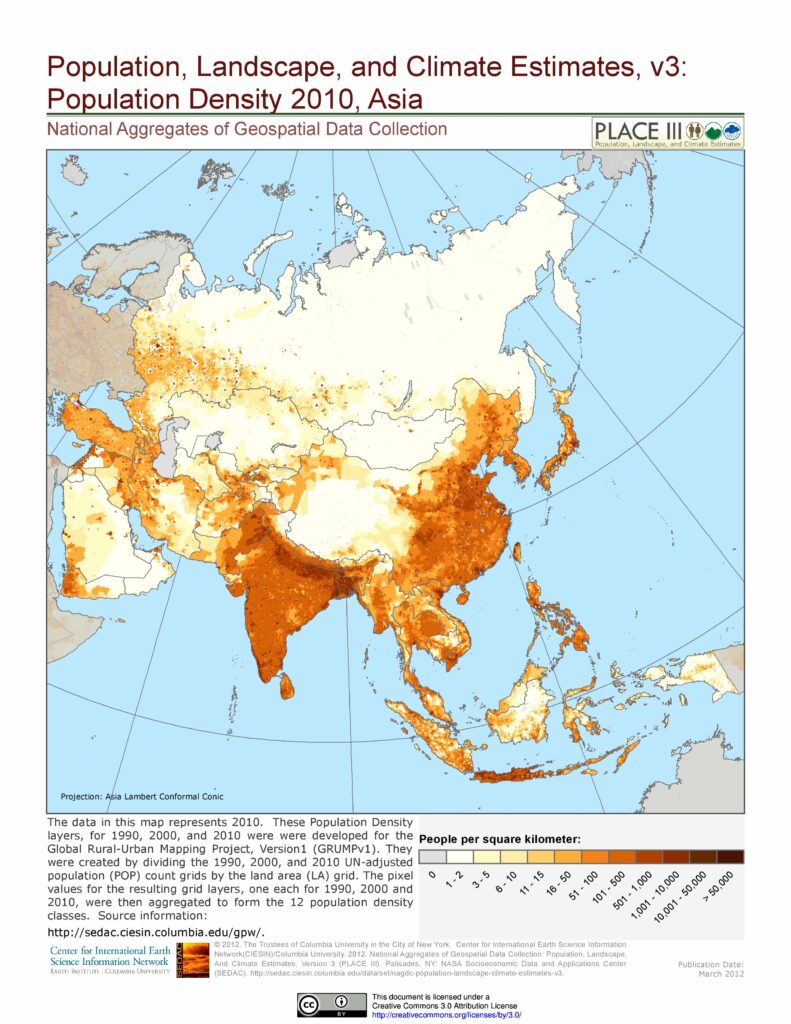
When it comes to population numbers, China and India beat out any other part or the world.
But how do China’s different administrative regions compare with other countries in the world? This next map by MapsbyNick shows various countries in the world with a similar population to that province.
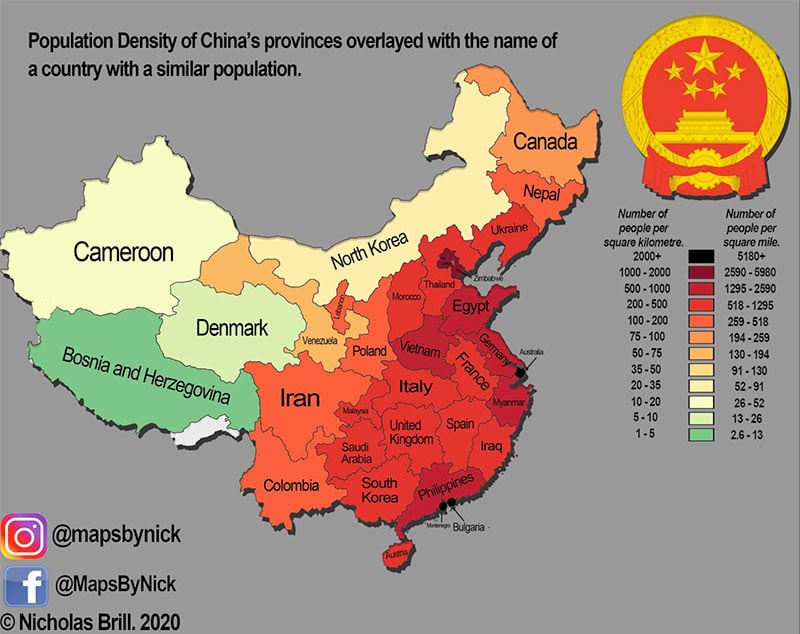
Finally, this next population density maps puts it all into perspective. How does China’s population density look within the context of the entire globe?
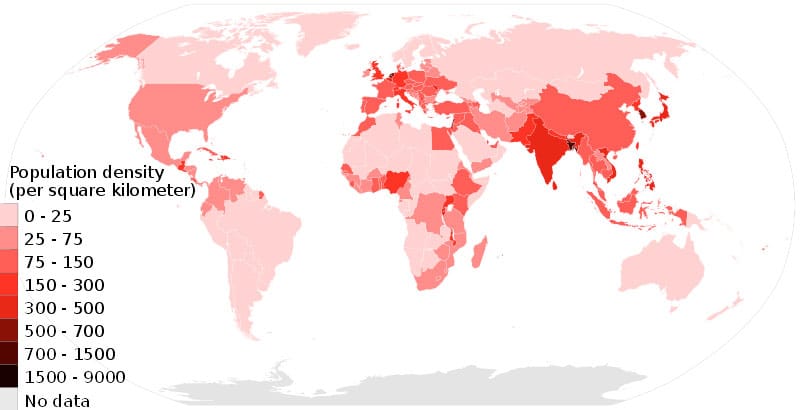
As you can see, these maps of China tell an interesting story, not just from a micro level (within the country) but also on a more macro level (in contrast to the rest of the world).
China’s population has boomed over the past century, but what makes it so interesting is how the people of China have congregated in major cities like Beijing, Shanghai, Chengdu and many others. Even “small” cities in China have millions of inhabitants!
Make sure you check out other interesting maps of China as well as some of my favorite hilarious “Chinglish” signs I’ve found in China!

The post China Population Density Maps appeared first on China Mike.
]]>The post China Translation FAILS! 18 Ridiculous Chinese Bathroom Signs appeared first on China Mike.
]]>If you’re looking for some good ‘ol Chinese “potty humor”, you won’t be disappointed by these poorly-translated bathroom signs.
Believe it or not, these types of translation errors can be found everywhere in China, not just the bathrooms.
You’d think that at some point somebody in China would say “You know, we have tons of foreigners living and working here in China…perhaps we should ask them how they would translate this?”
But nope. They don’t. They just translate however they darn well please. As if toilets in China weren’t interesting enough, they had to make the signs weird too. The translations they come up with are, well…
…interesting to say the least. Check it out.
1. Women Really are “Pests”
I heard that whoever was translating this sign had recently had a fight with their girlfriend. Gotta get rid of those pests!
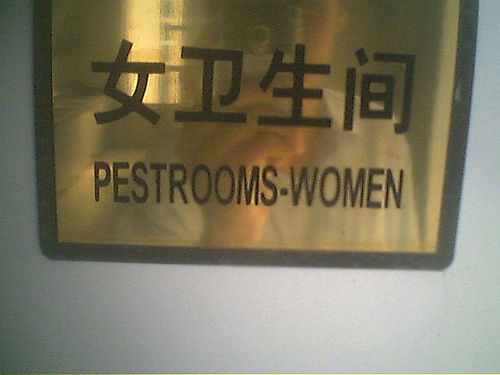
2. Male + Female = “Fale”
Worker: Hey boss, the sign doesn’t have enough room to write “female toilet”. What should I do?
Boss: No worries. Just combine “Male” and “Female” to create a new word “Fale” and people will understand what you mean.
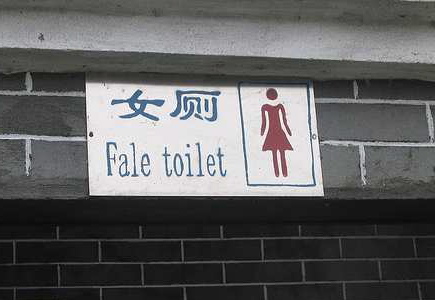
3. I Don’t Want What He’s Delivering
My friend is a mailman. I mean, he’s also a “maleman”, but I didn’t know there was any other kind of man to choose from.
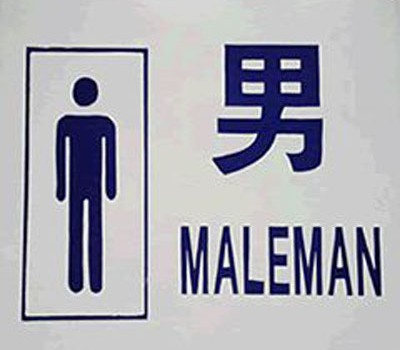
4. What is He Doing in There??
Honestly, I didn’t want to know what he was doing in there to begin with. Now? I’m petrified.
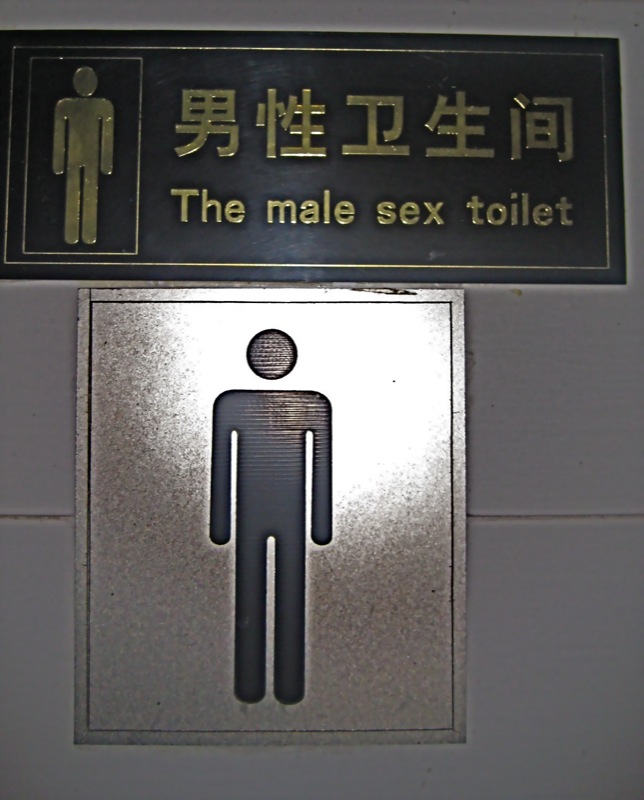
5. It’s a Stall, Not a Stable
Although I guess if you think about it, the stalls in a Chinese bathroom can look very similar to a horse stable. Yikes.
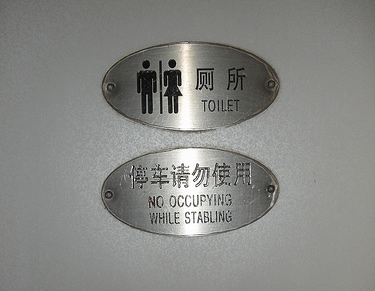
6. Would This Sign Be a “Stool Sample”?
This is one of those times when having two meanings of a word in English can come back to bite you. In this case, we’re confused with “stool” as a seat and “stool” as a…well, you know.
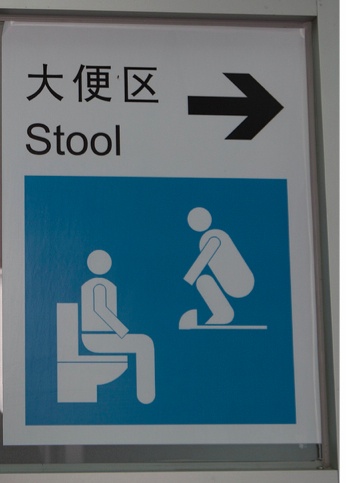
7. Keep an Eye Out for Hygiene
“…because if you find it, report it to us immediately. We will have none of that here in our Chinese bathrooms!!!”
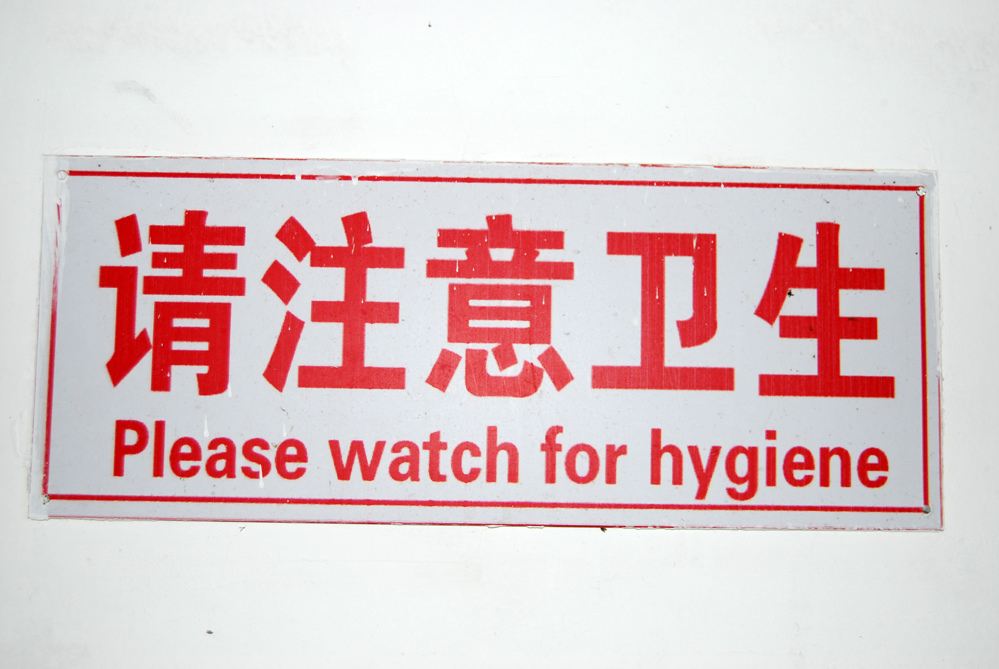
8. No #2 in HERE!
We will NOT tolerate anything other than urinating in this room! Take that sh#t elsewhere.
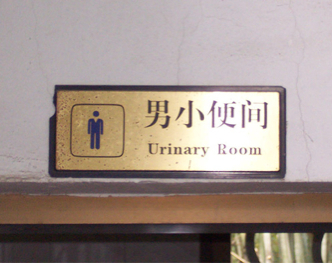
9. But What if You Have a Strong Urge?
Those who may feel strongly about using the bathroom need to look elsewhere. According to this poorly translated Chinglish sign in a Chinese bathroom, only the weak need sit here.
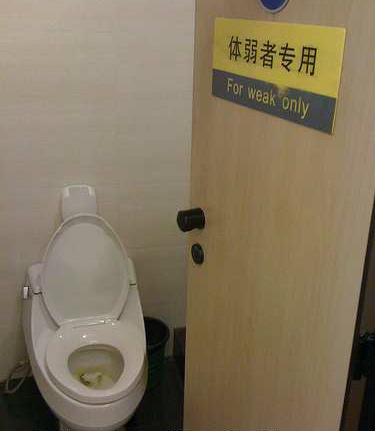
10. When a Translation is Literally “Bad”
Apparently the translator of this China bathroom sign knew that this bathroom was particularly bad. Either that, or he didn’t realize that the graphic was a wheelchair.
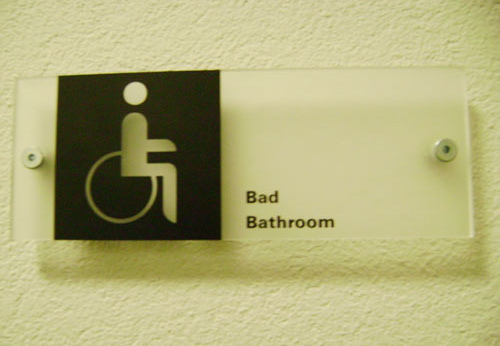
11. Where Deformed Men Go to Die
China is notoriously bad about its treatment of handicapped people, but this just goes a little too far, don’t you think?
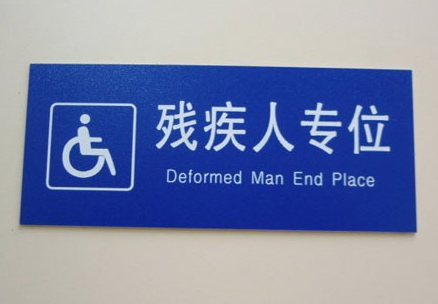
12. You See, This Means…Whaaaa?
Most poorly translated Chinese signs that we refer to as “Chinglish” are at least understandable. I mean, you know where they were coming from.
This guy? Whoah…I’m pretty sure he was drunk off his butt when he translated this.
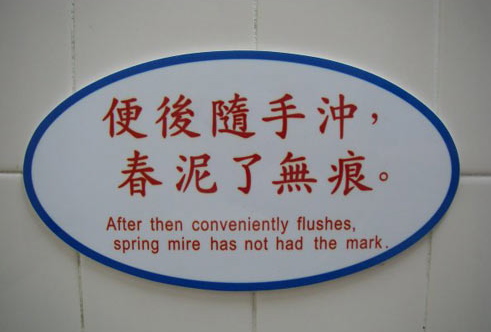
13. The Real Cause of Hemorrhoids
Now you know. Honestly, I know a few people who would like to install a sign like this in their own bathrooms for their spouses to see!

14. Don’t Srit, Please
Seriously, sritting is a really bad habit.
In this case, I’m actually grateful for the graphic. Otherwise, I might have mistaken the “r” in srit to supposed to have been an “h”. And that would have just been wrong!
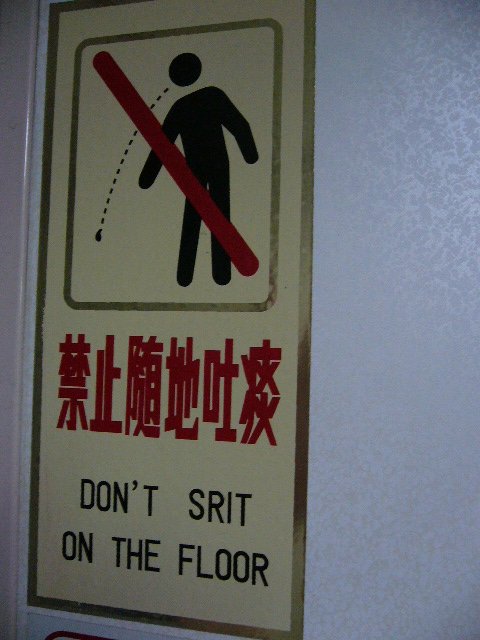
15. Oh, What Fresh Air!
Nobody’s quite sure what this translator meant. Anybody who has been anywhere near a public Chinese bathroom knows that there is no such thing as “fresh air” within 500 meters of that place.
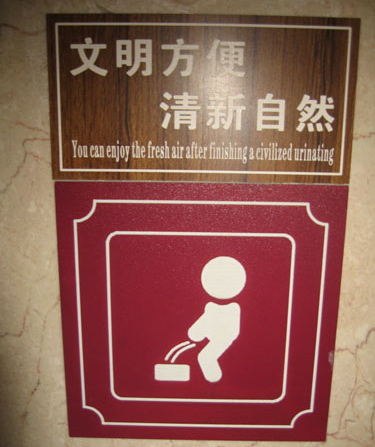
16. China Loves the Word “Civilized”
It’s true. If you see enough translated signs in China, you’ll see that they love the word civilized. And they want everything to be civilized.
Are you walking? Walk civilized. Are you peeing? For goodness sake, just be civilized about it, won’t you!?
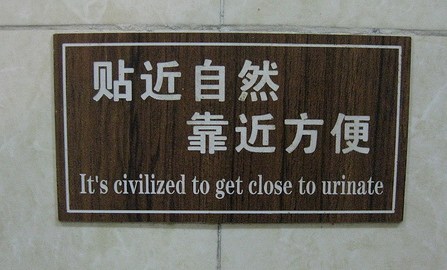
17. “One half step for man…”
…one giant leap for civilized mankind.
Again, that word civilized. In this case, all you need to do is precede half a step (whatever the heck that means) in order to be civilized.
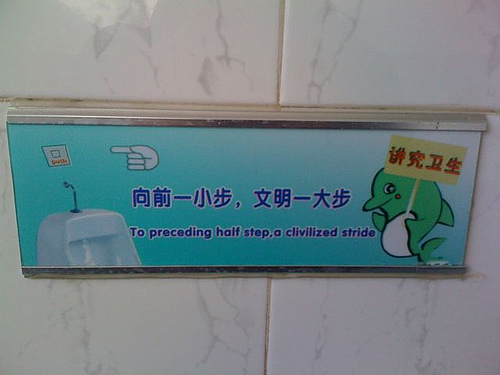
18. So What Are You Supposed to Do Here?
You have to wonder, if you can urinate or defecate in a bathroom…what are you supposed to be doing anyway?
And another thing: you gotta wonder just how bored the Chinese police are in this city that they would show up about a bathroom call.
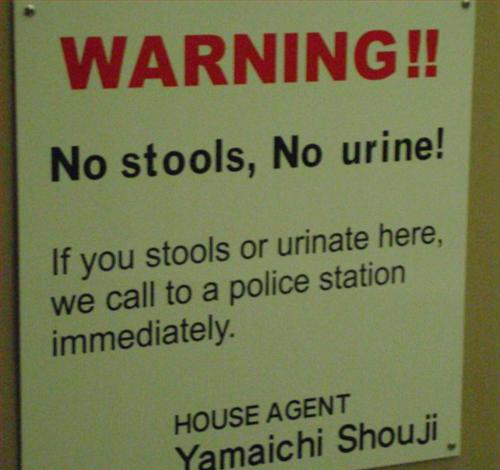
More Great Chinglish Signs
If these crappy translations on Chinese signs weren’t funny enough, check out even more great Chinglish signs to keep you laughing!
The post China Translation FAILS! 18 Ridiculous Chinese Bathroom Signs appeared first on China Mike.
]]>The post Best Shopping in Hong Kong (where to go and what to buy!) appeared first on China Mike.
]]>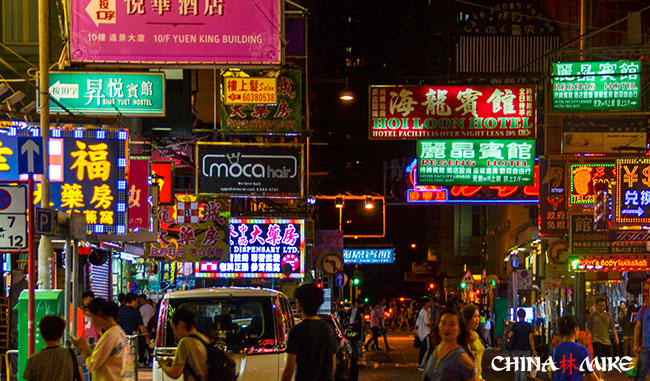
I’ll start this page with a confession: I’m not a big shopper. Especially when traveling (don’t want to carry any extra stuff).
So instead, I’ve researched all of the best websites and travel guides (just as I’ve done for the rest of this site). The result is my Hong Kong Shopping Guide, summarizing expert shoppers’ take on the best of HK shopping. Enjoy!
And while I’m not a shopaholic, shopping is certainly the favorite activity of Hong Kongers, who are sometimes described as being too materialistic and enamored with brand names. To illustrate the point, most stores in Hong Kong only close three days a year (first two days of Chinese New Year and, a bit oddly, Christmas).
Because Hong Kong has no sales tax, and is also a duty-free port (most imported goods aren’t taxed), it’s long been a favorite shopping destination. In fact, some goods are sold cheaper than the countries in which they were originally made.
For instance, many Japanese fly to Hong Kong to buy electronics, clothing, and pearls… that were imported from Japan! As a result, many visitors flock here less for the sights and more to go shopping in Hong Kong.
Still, Hong Kong is no longer the bargain shopping destination it once was years ago. Bargain-hunting aside, serious shoppers love Hong Kong for the wide variety of goods and shopping destinations. With luxurious high-end malls located next to the chaos of open-air markets, shopaholics flock to Hong Kong for the thrill of the hunt and the sheer volume of retail space.
A note on bargaining: Don’t bother trying to haggle in any shopping malls, department stores, or any other retail chains. But bargaining is expected and essential when shopping in HK’s markets. In general, you’ll should also try to haggle when shopping in smaller, independently owned shops. For more bargaining tips for China.
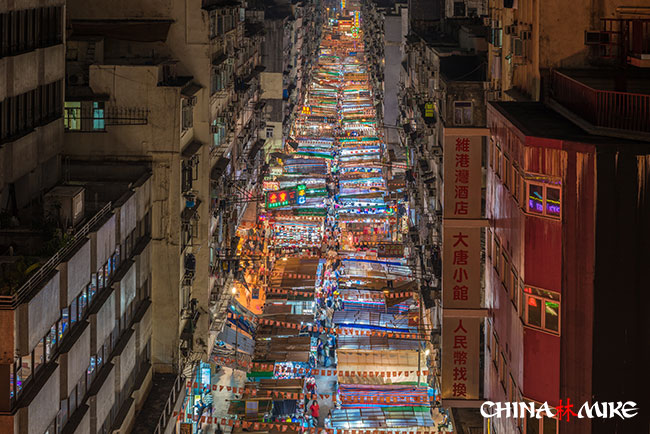
Are Hong Kong Goods Real or Fake?
It should come as no surprise that you can still buy a lot of counterfeit brand stuff while shopping in Hong Kong (such as clothes, purses, watches, etc).
If you’re headed to mainland China to shop, where of course most of it is manufactured, you should wait since you can buy it cheaper in China.
But while Hong Kong authorities mostly turn a blind eye to counterfeiters, you still risk having your fake goods confiscated by customs officials (and possibly risk a fine, although I understand it’s rare unless you’re sneaking in huge volumes of stuff for re-sale).
On a related note, it’s a good idea to keep your receipts (for genuine items) in case you need to show them to customs.
Beware of the “Old Bait & Switch”
Although this isn’t a widespread problem, you should be aware of the bait-and-switch scam among other popular China tourist scams. There are different variations, but here are the two most popular techniques, usually involving cameras and camcorders.
- Out of Stock Trick: One trick involves luring customers in with a cheap advertised price: After you pay, they “realize” that it’s out of stock and somehow strong-arm you into taking a (cheaper) “replacement” model (with so many models it’s really hard to compare).
- Replacement: Another tactic is to replace the product you think you bought with a defective or cheaper product. In HK (and China), always make sure that they are wrapping up the actual product you bought. In general, you should wait until you have product in hand before paying.
In HK, these tricks are mostly common in the electronics/cameras stores on Nathan Road in Kowloon (best to avoid altogether).
Hong Kong’s Best Shopping Areas
There are a number of great shopping districts throughout Hong Kong, but these are gnerally considered to be the best for short-term visitors and tourists.
HK Island > Central
Let’s start at the top. Hong Kong’s Central district is the high-rent district, with the swankiest shops and malls squeezed among the city’s skyscrapers when it comes to shopping in Hong Kong.
This is the place to go for a more upscale shopping experience and international designer brands, such as Louis Vuitton, Tiffany & Co, Gucci, Armani, Cartier, Chanel, along with all the other usual suspects. You’ll also find many high-end boutique stores, including the HK-only Harvey Nichols, Diane von Furstenberg, and Roger Vivier.
Central is where you’ll find HK’s pinnacle of conspicuous consumption, The Landmark, Hong Kong’s most upscale and priciest mall. The Landmark is also home to the 5-star Mandarin Oriental Hotel, as well as many top restaurants.
Just off the Central MTR station (and close to the ferry piers) is the IFC Mall, which many rank as Hong Kong’s second best mall. Though not as pricey as the Landmark, the IFC is considered an upscale mall, with a lot more retail space.
But if you had to pick just one mall for your shopping in Hong Kong area, it would have to be the swanky and huge Pacific Place. Though it’s not in this “Central” shopping area, it’s located nearby, just one MTR station east, right next to the Admiralty MTR station.
Pacific Place mall is home to a couple hundred shops, including more than 130 top-end retail brands, such as Burberry, Coach, Fendi, Versace, Dior, Dolce and Gabbana, Emporio Armani, French Connection, Gucci, Hermes, Hugo Boss, Jean Paul Gaultier, Louis Vutton, and Prada.
By the way, both Pacific Place and IFC Mall also have a good range of mid to upscale restaurants, in addition to the normal range of shops you’d normally find in a large, upscale mall (movie theater, gourmet grocery store, etc).
Back in Central, some other popular streets for shopping in Hong Kong are: Li Yuen Streets (East & West, two parallel streets that run between Queen’s Road Central and Des Voeux Road). You’ll find street stalls selling much cheaper fare, such as clothes, luggage, shoes, watches, costume jewelry, shoes, and more. They’re open daily, from about 10am to about 7pm. Nearby Lyndhurst Terrace is where you can find a decent number of shops peddling goods ranging from silks and other fabrics to antiques and crafts, to old maps, paintings and prints.
How to Get There: Central MTR station (For area maps, see my page with Hong Kong Transportation Maps)
HK Island > Causeway Bay
Causeway Bay is less ritzy and pricey compared to Central. A popular shopping destination for the locals, this area is usually very lively — packed with shoppers every day of the week.
Whereas Central can lay claim to the top luxury brands, Causeway Bay is the place to go for the full-on, shop-til-you-drop retail experience.
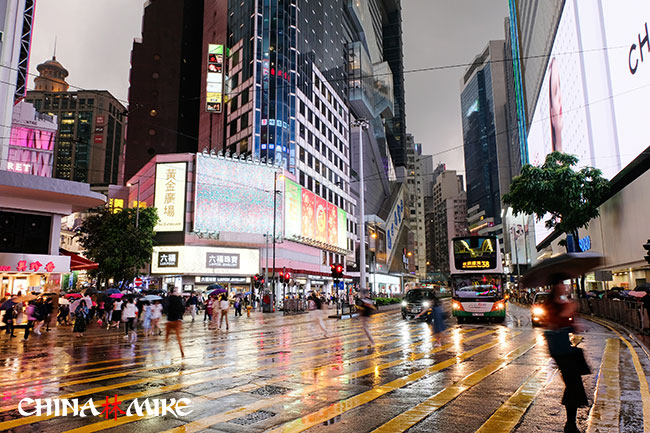
Much of the fashions along the main drag off of Hennessy Road are targeted to the younger set. Search out the Fashion Walk area for the popular grouping of hip, independent fashion retailers.
For less expensive clothes, seek out the alley markets around Jardine’s Crescent and Lee Garden Road.
Causeway Bay also has a great concentration of shopping malls and department stores, most notably the Japanese SOGO (HK’s largest department store), Lane Crawford department stores.
The best shopping malls in the area are:
- The Caroline Centre
- The Lee Garden
- Fashion Island
- Lee Theatre Plaza
- Times Square, one of HK’s first megamalls with over 100 up-market market retailers and restaurants, representing a good mix of local and international retail brands, such as Marks and Spencer and Lane Crawford.
On the 9th floor of Times Square mall, you’ll also find Page One Books, the best place for English books and magazines (two other HK locations in Kowloon).
How to Get There: Causeway Bay MTR station or Hong Kong Island Tram
HK Island > Hollywood Street & Cat Street Bazaar
Moving from the massive shopping districts to a smaller specialty area, Hollywood Road and parallel Cat Street (Upper Lascar Row) is the place to shop in Hong Kong for art, antiques and curios. You’ll find an eclectic mix of items for sale, ranging from expensive Ming vases and jade carvings to snuff bottles and Mao memorabilia.
Whereas Cat Street gives a flea-market like atmosphere — selling mostly has cheaper Chinese souvenirs and curio like old HK postcards and posters and fake, antique watches— Hollywood Street has long been known as the place to go in HK for buying expensive antiques, ceramics and furniture.
It’s also home to most of Hong Kong’s art galleries and considered an excellent place to pick up something from China’s booming contemporary art scene.
Hollywood Road is also a good place to buy carpets, in particular ones imported from India and the Middle East (also see nearby Wyndham Street for other carpet specialty shops).
Another place for carpet shopping is across the harbor in Kowloon: the Chinese Carpet Centre offers more than 100,000 mostly handmade Chinese carpets (New World Centre, 18-24 Salisbury Rd., Tsim Sha Tsui , www.cccrugs.com.hk).
How to Get There: Sheung Wan MTR station (or walk from Central)
Kowloon > Mong Kok
On the other side of the harbor in Kowloon, you’ll find the Hong Kong area’s other top shopping districts.
Kowloon offers a rather odd mix of both high-end goods as well as cheap-o merchandise….often right next to each other. Translated as “busy corner” in Cantonese, the Mong Kok area is the world’s most densely populated, according to the Guinness Book of Records.
A far cry from the ritzy upscale shops and international brands of Central and Causeway Bay, this is the place to shop to “keep it real.” Although many of the shops here are less targeted to locals than to tourists, it doesn’t mean that it’s one big overpriced tourist trap; you can grab some great stuff and great bargains here. The Mong Kok area sells a wide range of goods, from clothes and cosmetics to exotic fish to cameras/electronics.
The area is best known for its most famous market, the so-called “Ladies Market” (but there’s plenty of men’s goods as well).
Consisting of hundreds of stalls, this open-air bazaar-like market is considered the best place to buy fake, knock-off goods like handbags, watches, and pretty much anything else that can be copied and sold. It’s safe to assume that any name brand is a counterfeit copy, made somewhere in China.
Besides clothes and accessories, the Ladies Market also sells toys, electronics, and all kinds of Chinese gifts and curios. Bargaining is the name of the game here and veteran sellers know every trick in the book to take advantage of green, clueless tourists so make sure to check out my negotiating tips page.
Specialized markets in the Mong Kok area include a market for songbirds (Yuen Po Street) and one for aquarium fish, as well as the Flower Market, and the Mongkok Computer Centre (considered the best place in HK for lower-end electronics gear).
How to Get There: Mong Kok MTR station, Kowloon
Kowloon > Temple Street Night Market
Nearby, just one MTR stop south of Mong Kok, you’ll find the Temple Street Night Market. Hong Kong’s most famous and liveliest market, this market is a tourist sight in itself — a destination to not only shop, but also to take in the spectacle or just hang out and grab a bite to eat.
There are literally hundreds of small stores and stalls running for several blocks on Temple Street, selling mostly cheaper goods, such as t-shirts and other clothing, handbags, accessories, sunglasses, pirated CDs and DVDs, house and cookware, small electronics & toys, and all manner of Chinese souvenirs.
As you probably guessed, they also sell plenty of fake brands too. If you’re there just for the shopping, you might want to go on the earlier side, around 6pm or so. But to soak in the atmosphere, wait until the action gets going around 7-10pm. Most vendors start closing down for the day around 11pm.
The Temple Street Night Market in Hong Kong is a good place to get a cheap seafood dinner as well. There are cheap restaurants with small tables outside spilling right into the middle of the street action.
You can grab a bite, have some beers, and watch all the action. Adding to the atmosphere are street singers and dozens of fortune tellers (many who speak English), offering palm reading, tarot cards, etc. They set up shop in an area close to the Tin Hau Temple.
Just southwest of the night market is Jade Street and the Jade Hawker Bazaar, selling—you guessed it—all manner of jade products.
How to Get There: Yau Ma Tei MTR station, Kowloon
Kowloon > Tsim Sha Tsui
Even farther south, on the tip of Kowloon, the Tsim Sha Tsui area is yet another hot spot of retail activity.
But instead of an open-air market shopping experience, the area is packed full of shops along the main street, Nathan Road (the so-called Golden Mile, full of shopping arcades, department stores, emporiums, hotels, restaurants, and nightlife.
There’s plenty of retail action on the side streets off of Nathan Road, as well, where you can find everything from tailors and tattoo artists to Chinese crafts and camera shops (not recommended) to shoes and jewelry.
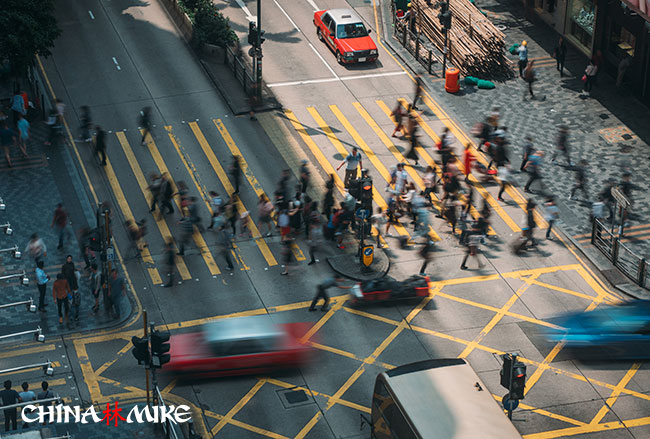
One side street off of Nathan Rd is Granville Road, where you can find some good factory outlets and relatively cheap clothing aimed at younger shoppers.
For the best all-under-one-roof shopping destination for shopping in Hong Kong, the enormous Harbour City is the place for you.
Being very close to the Star Ferry Pier in TST, this is the largest shopping center in Hong Kong, the massive mall boasts almost 800 shops in four interconnected complexes that are spread out over some 3 kilometers. Naturally, the complex has virtually every manner of restaurant, in addition to two separate movie theaters (not a bad place to drop the kids off while you shop!).
How to Get There: Tsim Sha Tsui MTR station, Kowloon
HK Island > Stanley Market
Back on Hong Kong Island — but way down in the southern end, away from the urban jungle—is Stanley Market.
Compared to the above markets, the Stanley Market is considered relatively small but is much more mellow and scenic (the waterfront promenade is a nice spot for a relaxing lunch). Although geared mainly to the tourists that come down that way, it’s not considered a tourist trap. The consensus is that it’s not the place to get the best deals, but in general, offers inexpensive goods that are reasonably priced.
The main offerings are inexpensive fashions, mainly silk clothing, and casual and business wear (lots of large sizes). But you can also find Chinese handicrafts and paintings, along with curios, souvenirs and toys.
Many have commented that Stanley Market’s more relaxed vibe makes it the best place to introduce bargaining rookies to Hong Kong’s more rough and tumble urban markets.
How to Get There: From Chai Wan MTR station, taxi or Exit C for green minibus 16M. Or from Exchange Square bus terminus in Central, take regular buses: 6, 6A, or 260.
Hong Kong’s Most Famous Stores
Following along with the most popular shopping districts, the following are the most famous stores you can find in Hong Kong.
Shanghai Tang
- 1 Duddell Street, Central (+ other HK locations)
- Tel: +852 2525 7333
- Mon to Sun 10.30am – 8.00pm
The stylishly hip Shanghai Tang is highlighted by many HK shopping and travel guides as a top pick. It’s also a good place to pick up some cool accessories and Chinese souvenirs (like novelty watches that replace numbers with dim sum or mah jong tiles).
In the above Central location, the adjacent Pedder Building houses six floors containing dozens of factory outlets and clothing boutique shops.
Sam’s Tailor (Men’s Clothing)
- Burlington House, 90-94 Nathan Rd., Tsim Sha Tsui, Kowloon
- 2367-9423
Another top pick of many guides including a Fodor’s Choice selection:
“(Sam’s Tailor is) in humble Burlington House, a tailoring hub, have hosted everyone from U.S. presidents (back as far as Richard Nixon) to performers such as the Black Eyed Peas, Kylie Minogue, and Blondie.This former uniform tailor to the British troops once even made a suit for Prince Charles in a record hour and 52 minutes. The men’s and women’s tailor does accept 24-hour suit or shirt orders, but will take about two days if you’re not in a hurry.”
Yue Hwa Chinese Products Emporium
- 301 Nathan Rd., Jordan, Kowloon (Jordan MTR)
- 3511-2222
The Yue Hwa Chinese Products Emporium is five floors containing Chinese goods, ranging from clothing, silk pajamas, and chopsticks sets to teapots (and lots of tea) and traditional Chinese medicine.
The post Best Shopping in Hong Kong (where to go and what to buy!) appeared first on China Mike.
]]>The post Accommodation in China | Hotels, Hostels & More appeared first on China Mike.
]]>I’ll also share some accommodation tips you should keep in mind before beginning your search.
When it comes to accommodation in China, it continues to improve and grow at a rapid pace. You will find that most cities in China have a range of good options from budget to top-end (luxury).
China’s tourism industry also continues to climb a rather steep learning curve.
A few decades ago, foreign travelers were only allowed to stay in designated Chinese hotels, but today it’s mostly wide open (many smaller, cheaper places still don’t have a license to legally rent to foreigners).
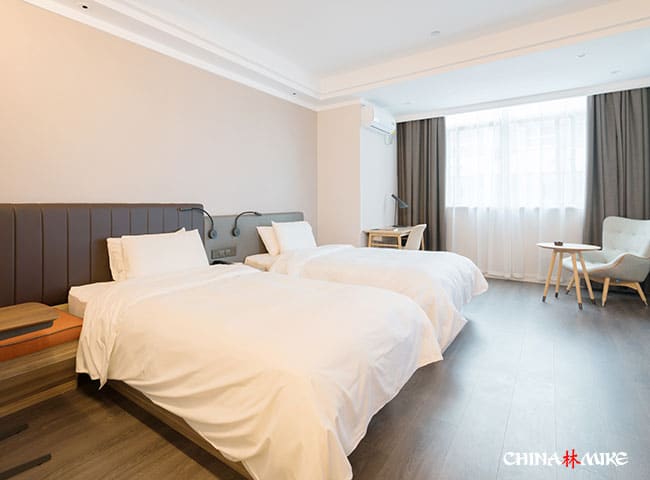
And as China’s tourism industry grows, new hotels and hostels are springing up everywhere so you’ll find good options regardless of your budget.
A few key take-aways:
- Look for the new: There are a lot of new places opening up all the time. Curiously, their rates will often be the same as much older, more run-down places in the same category.
- Don’t be shy about bargaining: This is a bargaining culture — posted rates are often just a starting point. If their occupancy rate is low (and/or you’re willing to commit to several nights), it’s very possible to get 30% or more off.
- Always check your room to make sure everything is in working order. Given China’s construction boom and dubious reputation for quality control; it’s common to find things broken even in the more upscale hotels. Check everything from lights, air-conditioning, hot water, TV & remote, phone, leaks, mini-fridge, towels, soap, etc, and don’t trust that they’ll necessarily keep their promise to immediately fix a problem—ask to see another room.
Find the Best China Hotels!
Book online with your foreign credit card.
China Hotel Tips & Tricks
Based on my years of traveling and staying in different China hotels – from 3-star to 5-star – here are a few tips and tricks to help you set expectations and make the most of your hotel stay.
- Hotel Deposits: In budget to mid-range hotels, you’ll not only have to pre-pay for your room, you’ll have to leave a small room/key deposit. Make sure to keep the deposit receipt since you’ll need it to get back your deposit when checking out.
- Key Cards in China Hotels: Most hotels in China these days use a key card instead of a physical key. You’ll have to insert this key into the slot by the door to turn on the power in your room (a clever environmentally-sound practice in many Asian hotels to ensure that electricity isn’t wasted when no one is in the room).
- Grab a Hotel Business Card: When you check in, remember to grab your hotel’s business card. In addition to their address, it will sometimes have a small map. It’s all too easy to lose your bearings on a stroll so you can use it to ask for directions (as well as show your taxi driver). NOTE: Your hotel’s Chinese name will often have no relation to the English name, so no taxi driver will know where the “Golden Paradise Premium Hotel #1” is.
- Be Smart With Your Luggage: When you leave your room, make sure you either have your important belongings with you (passport, money, wallet, etc.) or you’ve put it in the safe box that often comes with a Chinese hotel. In most cases, your luggage will be safe in your room, but you can’t always assume this will be true.
- Unplug Your Phon! Unless you’re expecting a call from someone, unplug the phone in your room. Otherwise, you might get creepy calls at odd hours from prostitutes offering you a “massagee” (I think they’re tipped off by hotel staff). I read a posting somewhere by a male traveler who got a knock on his door; after opening it (bad call), a shady hooker forced her way in and refused to leave until he paid her for taxi fare! Seriously?!
Types of Hotels in China
For the purpose of this article, I’ve grouped accommodation in China into three general categories.
China’s tourism industry does use a “Star” system to rate facilities and quality, similar to us in the West.
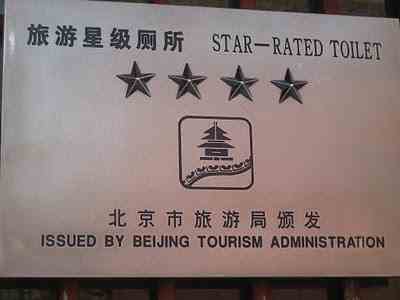
Don’t put too much stock in these star ratings because the system of awarding of stars is (surprise!) subject to bribery.
Often, the number of stars doesn’t necessarily reflect actual quality. The motto for pretty much everything in China these days is “Buyer beware”.
Luxury Chinese Hotel Options
Price range: Y700-1500+ (US$100-220+), with 15% service charge
These are larger 4- and 5-star luxury hotels in China that usually have some English speaking staff, as well as the usual restaurants, swimming pools, health facilities, internet facilities, and so on.
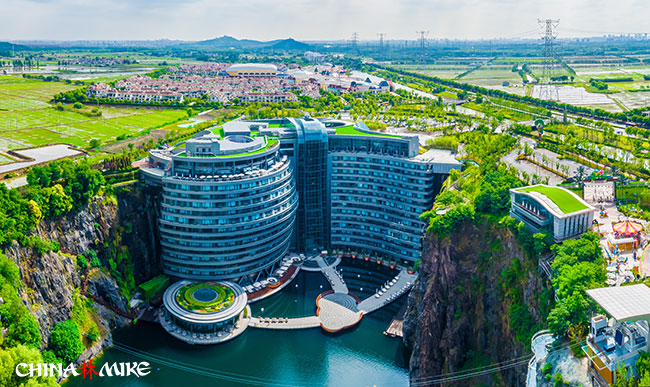
In the bigger cities, your best bet is to go with the international chains (Hyatt, Hilton, Marriott, Sheraton, Ritz Carlton, etc). The Chinese-owned hotels in this category tend to offer less consistent service and quality control.
Expert Tip for China Hotels
As a foreigner, you can always stroll into 5-star hotels to use their clean toilets or have a rest. No one questions—or cares—if they see you hanging around the lobby. Sometimes I’ll even check my bag in for an afternoon if I’ve already checked out of my own hotel.
There are a number of great places where you can search for these luxury hotels in China. While major Online Travel Agencies (OTAs) like Expedia or Orbitz work fine, you’ll often get a better deal if you use a Chinese-based or Asian-based company like:
- Trip.com Hotels: This used to be known as Ctrip, and they’re a China-based company that usually has the best deals.
- Agoda Hotels: The most popular Asia-based OTA has an excellent selection of luxury Chinese hotel rooms.
Mid-Range China Hotels
Price range: around Y150-350+ (US$20-50)
There are a lot of options in this price range. Since the Chinese are immensely practical people, many hotels in this category (especially the older ones) are functional but ugly.
This includes a basic room with private bathroom, A/C, and a TV (not that there’s anything to watch).
Also, unless you’re in a tourist destination that’s popular with foreigners, chances are slim for finding a competent English speaking staff.
Notice to Budget Travelers
Some of these mid-range hotels in China also have cheap dorm beds available. And others have cheaper, private rooms for about the same price as staying in a hostel. It’s worth asking.
To meet rising demand from a growing Chinese domestic middle class, some good motel chains have been popping up in a lot of cities (kind of the “Motel 6” of China). Renting for only around Y150 and up, they’re popular so try to book in advance:
- Jinjiang Inn
- Home Inn
Budget China Hostels
Price range: Y20-100 (US$3-15)
Budget hotels and hostels in China tend to be near train and bus stations. Accommodation in this category ranges from run-down private rooms with bathroom to a bed in a dorm with a shared bathroom.
Being a culture accustomed to little privacy, the cheaper ones will often rent individual beds in a room, meaning you might share your room with others. Often, they’ll try to put same-sex foreigners together.
Hostels themselves are a growing trend in China, especially now that China’s youth are starting to venture out and travel on their own.
Hostels in China are more common in Hong Kong, Shanghai, and Beijing, as well as backpacking-friendly places like Yangshuo and Xi’an.
These can be a good option for solo travelers looking to meet others and share rides. Some also have organized tours as well as rent bikes, and arrange transportation tickets.
Another option in some cities is university accommodation — very basic but cheap (dorms as low as Y20-30). They sometimes have option of paying more for a private room.
If you’re someone who likes to have everything booked in advance, search Hostelworld to see what’s available.
TIP: Bring earplugs (I don’t believe there’s a Chinese translation for “noise pollution”) and lock up your valuables in shared accommodation.
Booking in Advance| Hotels in China
Unless I’m traveling to a popular place during a busy tourist season (or arriving in a city late which I avoid whenever possible), I personally don’t book in advance since I prefer to keep my options open.
I not only have the luxury of seeing a room in person, I’ve found that I’m able to negotiate a better rate (advance booking rate will usually be higher than walk-up depending on demand).
But since you usually won’t be required to leave a credit card to book in advance (unless it’s up-market hotels), it doesn’t hurt to book in advance since you can cancel without penalty if needed.
Outside of luxury hotels, it can be hard to find English-speaking staff to take your reservation in China (don’t be surprised if they just hang up on you!). So ask a local (e.g. current hotel clerk) to call to book in advance for you.
Other Accommodation in China
If you’re staying in a particular city in China for an extended visit, look into a long-term furnished apartment rental. Many are high-rise luxury complexes with swimming pools, gyms, and so on. There’s a good supply of these in Shanghai, Beijing, and Hong Kong.
Keep in mind that you’ll have to register your stay at these places with the police (which is something that a hotel would do for you).
Because of this hassle, it’s often best to just spend your time at a reasonable hotel or hostel in China. Make sure you check out Trip.com’s hotels page, the Asia-based Agoda hotels and if you’re looking for hostels, the Hostelworld website.
Are you looking for more tips about traveling to China? Checkout this article on more practical tips for China Travel.
The post Accommodation in China | Hotels, Hostels & More appeared first on China Mike.
]]>